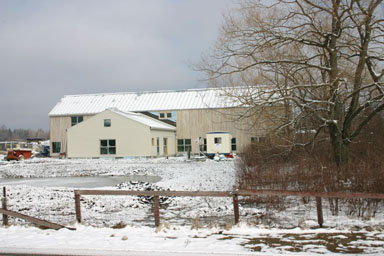March 1, 2004
Fifth grader to New Zealand, economy to improve
In today's Dryden Town Talk, Cathy Wakeman tells of Kody Kirkland, a fifth-grade student at Dryden Elementary who will be a "student ambassador to Australia and New Zealand" along with sixteen other kids from central New York and a dozen from Philadelphia.
She also notes that registration for Kiwanis baseball and softball, for kids from kindgeraten through seventh grade who live in the Town of Dryden or the Dryden Central School District, is this week and next.
Also in the Journal, Professor Elia Kacapyr, who writes the monthly pieces on the Tompkins County economy, told the Tompkins County Chamber of Commerce that the area could expect to see around 1,000 jobs created this year. Only 200 jobs were created last year.
There's also a letter to the editor from Shirley Woods of Freeville castigating the Mayor of San Francisco for permitting gay marriage.
Assessments and taxes
The Ithaca Journal's editorial today examines the annual assessment process. This process has come under fire lately, largely because taxes and assessments have risen at the same time. I think the Journal is right that annual assessment and a central county office for doing it is a wise idea, but they lose me when they write:
Property owners -- read voters -- are reminded of the impact of government spending each year when they receive their reassessment notices.
It's a very strange statement to make in the middle of an article that's taken great pains to note that assessments and taxation are separate processes. While the assessment notice does sort of do that, listing current taxes and what taxes would be if rates continued at last year's levels, it's a spurious comparison for all the reasons that the Journal makes plain in the rest of its piece.
There is definitely something good in the annual assessment notices, however - property owners get a baseline value for their property and a general sense of whether its value has increased or decreased over the past year. Knowing what a property is worth, even if government, bank, and market assessments vary, gives owners a chance to think about what they want to do with their property, and whether investments in that property have any chance of paying off.
The assessment on my house has gone up 44% since we purchased it. We've taken advantage of that increase to refinance the house, improving our overall financial situation, not to mention that we feel more comfortable investing in improvements. It's a nice place to be.
Yes, taxes have increased - but if the house's value hadn't changed at all, I don't think the tax levy would be any smaller, and I'd have both higher taxes and a property whose value remained the same.
Fortunately, the Journal and I agree on the conclusion:
Property owners who are concerned about their tax bills should focus their efforts on the towns, counties, schools, fire districts and villages that impose the tax levys. The only ongoing issue that taxpayers should have regarding their actual assessments is accuracy. If the assessments accurately reflect what their homes or businesses could sell for, then they are paying their fair share.
When it comes to the assessment procedure, Tompkins County has it right. It should not buckle to pressure and throw out this fair and equitable process.
(Also, if you're curious, the Department of Assessment provides all kinds of information on how assessments are derived, including this map (269KB PDF) of assessment neighborhoods in the town of Dryden and this explanation of the map key. There's even a searchable on-line database of properties and values if you want to compare your assessment to your neighbors.)
Conservation Board public hearing
The legal notice for the hearing on the law turning the town's. Conservation Advisory Council into a Conservation Board has been published. The hearing will be at 7:00pm on March 11, coinciding with the regularly scheduled Town Board meeting.
NOTICE OF PUBLIC HEARING ON PROPOSED TOWN OF DRYDEN LOCAL LAW
PLEASE TAKE NOTICE that the Town Board of the Town of Dryden will hold a public hearing on a proposed local law which would (re)designate the Conservation Advisory Council as a Conservation Board, require the Conservation Board to report on applications referred to it by various boards of the town and continue the function and responsibilities of the Conservation Advisory Council as a Conservation Board. Copies of the proposed local law are available at the town clerk's office.
The public hearing on the proposed local law will be held at 7:00 p.m. prevailing time at the Town Hall, 65 East Main Street, Dryden, New York, on March 11, 2004, at which time interested parties will be heard.
March 2, 2004
Tech classes, indictments
Today's Ithaca Journal reports that Tompkins-Cortland Community College is planning to add associate's degree programs in computer support and Web design. The New York State Education Department must approve the proposal.
Also in today's Journal is news of two indictments of Dryden residents, one for forgery and one for felony DWI.
Democratic presidential primary today
Registered Democrats can vote today in the presidential primary. (Republicans don't have a primary this year, and only people registered as members of a party can vote in that party's primaries in New York State.)
Polls are open from noon to 9pm today. For a map of election districts and polling stations, see the Town of Dryden Election Districts map (597KB PDF), or call the Board of Elections at (607) 274-5522.
March 3, 2004
Commuters, ballots, assessment
It's another quiet day for news in Dryden, but the Ithaca Journal has a story on commuters who drive from other counties to Tompkins County, many of whom drive through Dryden, as well as information on absentee ballots for upcoming village elections and an additional class on assessments.
The newly-scheduled assessment class will be at the BOCES building on Warren Road (map) , March 15th from 7-9pm.
Freeville village elections appear uncontested
The Shopper has an Election Notice for the Village of Freeville today. All of the candidates are on the "Citizens Party" line (Freeville elections aren't along traditional party lines) and there appear to be no contests this year.
The nominees are Lotte Carpenter for Mayor, Diana J. Radford and Penny Beebe for two-year Trustee terms, and Thomas A. Lyson for a one-year trustee term.
Voting will be on Tuesday, March 16th, from noon to 9pm at the Village Hall (map).
March 4, 2004
New principal, roof repairs, elections
Today's Ithaca Journal has a story on the new principal of Dryden Middle School, Roger Fedele, interviewing both Fedele and Dryden parents. There will be a welcoming reception for Fedele on March 8th, at 7pm in the Middle School cafeteria.
In the Ithaca City School District, they're repairing lots and lots of school roofs with extra money that has become available since last year's budget.
On the editorial page, the main editorial discusses upcoming elections, including the March 16th village elections, for which tomorrow is the last day to register.
Also on the editorial page are letters from Town of Dryden resident and Cornell research associate David Conner questioning genetically-modified organisms and Cornell's role in their creation, and Town of Dryden resident Charlie Hart, who manages to get some Clinton-bashing in while complaining about Bush-bashing.
Village of Dryden elections
I've been surprised by how little coverage village elections have had this year, though at least today's Ithaca Journal editorial mentions village elections. Even finding out who the candidates are has been a challenge, though yesterday's Shopper included a notice on Freeville elections.
Thanks to County Legislator Michael Lane, I now have a complete list of who is running for the two two-year trustee positions and the one one-year position. (The mayor is not up for election this year.)
There are only two candidates for the two two-year positions, so both (barring a write-in campaign) are likely to be elected. Mary Ellen Bossack, a Democrat, and Daniel Wakeman, a Republican, are both running for re-election.
There is a contest for the one-year position, with Daniel Potter, a Democrat, running against Robert Witty, a Republican. Witty was appointed by the mayor to take Michael Hattery's seat, which he resigned when he became a member of the Town Board.
Voting for these positions will take place at the Village Hall (map) on March 16th. Absentee ballots are also available from the Tompkins County Board of Elections. According the the Journal, they must be mailed by March 9th or delivered in person by 4:30pm on March 15th.
March 5, 2004
Local issues, county taxes
This morning's Ithaca Journal includes two articles looking at issues affecting towns throughout the county, though neither has much Dryden-specific detail. The first looks at how towns outside the City and Town of Ithaca plan not to accept marriage certificate applications from same-sex couples, while the other looks at tax exemptions for seniors.
County Legislator Michael Lane has a letter to the editor, criticizing the prospect of an increased mortgage tax. Lane notes that while "proposed use of mortgage tax revenue for transportation is commendable", "closing costs to obtain home mortgages have skyrocketed", producing yet another barrier to buying a home in Tompkins County. He also notes that the mortgage tax is not a particularly reliable form of revenue.
Annexation, golf course in Dryden Courier
I wish the Dryden Courier was more readily available. Its sister publication, the Ithaca Times, is widely available, both for free in the Ithaca area (extending out to at least the Route 13/366 overlap) and online, while the Dryden Courier is 75¢, and I haven't found it any closer to me than the Village of Dryden.
This week's issue has excellent articles on two issues I haven't been able to find much about: the proposed annexation of a 21-acre lot by the Village of Dryden from the Town of Dryden, and the Town Board's consideration of purchasing the Lakeview Golf Course on Dryden Lake.
According to Tony Hall's "Annexation Debate Continues", the Town Board is split on whether or not to permit annexation (which the Village appears to favor). Councilmen Hattery and Stelick support annexation, while Councilmen Christofferson and Michaels, along with (non-voting) Town Attorney Mahlon Perkins, oppose it. Supervisor Steve Trumbull appears to hold the deciding vote in the matter.
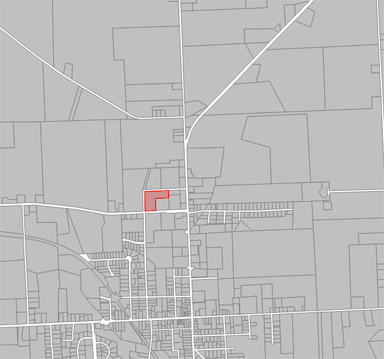
The parcel being considered for annexation by the Village of Dryden.
There are lots and lots of issues around this annexation, but the largest ones appear to revolve around sewer and water, services the Village provides to the Town but with issues about volume and a moratorium on new hookups, along with the intended use of the area as a New York Department of Transportation facility. The DOT facility would make the land tax-exempt, at least on the portions used by the DOT, and there are concerns from the town that both the nearby schools would be affected (by traffic) and that the messiness of the operation ("a chilling aesthetic effect") would not add to the area's appeal.
On the golf course, I'd wondered what the Town Board was up to, voting themselves a negative SEQR declaration in executive session. According to the Courier, their intentions are honorable, seeking to take advantage of a "once in a lifetime opportunity." By buying the sixty acres, the town would both have a huge opportunity to create new recreation opportunities and keep the parcel out of the hands of commercial developers. The Courier quotes Town Supervisor Steve Trumbull:
"I'm worried that someone's going to buy it for development. If that occurs, there goes the golf course and there goes the last view of the lake," Trumbull said.
"We wanted to save it as open space. We didn't want it to go into development," he added.
The board approved an appraisal of "a certain piece of real property" at the December 10, 2003 meeting, and this appears to be the continuation of that. According to the article, the town offered $350,000, but the owner wants $850,000, and the property is assessed at $550,000. Two other offers for the property were both less than the town's offer.
If you have a chance, pick up the Dryden Courier for more details.
March 6, 2004
Summer school, art scholarship, board briefs
Today's Dryden schools news comes from three different papers.
The Ithaca Journal reports that the Dryden Central School District will include summer school funds in its budget, providing juniors and seniors who need to pass classes to graduate to take courses. The closing of TC3's summer school had left uncertainty about whether Dryden would participate in a new arrangement with BOCES.
In the Dryden Courier (not available online, unfortunately), there is an article on a full tuition scholarship to The College of Saint Rose awarded to Dryden High School senior Carolyn Edgecomb.
Finally, this week's Shopper includes the Dryden Central School Board Briefs for the February 24 meeting.
Partial hamlets census
The Draft Comprehensive Plan actually defines four hamlets within the town, though Etna and Varna are the two most frequently discussed. The other two hamlets are fragments, one being the Dryden side of McLean, which is largely in the Town of Groton, and the other being a tract of land north of the Village of Dryden and east of Route 13.
Like Varna and Etna, these hamlets have no official standing with the Census Bureau, so I've had to make some estimates of which census blocks are in the hamlets, using the same techniques I used to collect census data for Etna and Varna.
In Figure 5-1 of the Draft Comprehensive Plan (301 KB PDF), the hamlet north of Dryden looks like the picture below. The "hamlet" portion this calculation is about is just the yellow.
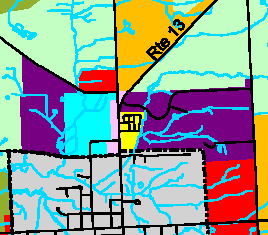
The hamlet area north of Dryden, as defined in yellow by the Draft Comprehensive Plan.
A comparable area, defined in census blocks, is highlighted here:

Census blocks which include the hamlet north of the Village of Dryden as defined by the Draft Comprehensive Plan.
The Dryden portion of McLean is slightly more difficult, as most of southwestern McLean is one large (and not particularly dense) census block. In the Draft Comprehensive Plan, the Dryden portion of the McLean hamlet is highlighted in yellow:
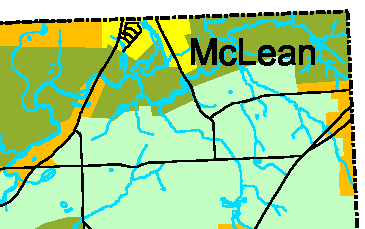
The McLean hamlet area in the Town of Dryden, as defined in yellow by the Draft Comprehensive Plan.
A roughly comparable area, defined in census blocks, is highlighted here:

Census blocks which include the Town of Dryden portion of the hamlet of McLean as defined by the Draft Comprehensive Plan.
The westernmost block highlighted there contained 56 people, 19 households, and 20 housing units (only one of which was rental) in the 2000 census.
The results for these areas are given in the tables below. The population totals look like:
| Population | McLean | Dryden Hamlet Area |
|---|---|---|
| Total | 324 | 219 |
| White | 316 | 211 |
| Black | 6 | 6 |
| American Indian/Eskimo | 1 | 0 |
| Asian | 0 | 0 |
| Hawaiian/Pacific Islander | 0 | 0 |
| Other | 0 | 0 |
| Multi-racial | 1 | 2 |
| Hispanic | 2 | 0 |
| Males | 163 | 113 |
| Females | 161 | 106 |
| Under 5 | 31 | 20 |
| 5 to 17 | 60 | 49 |
| 18 to 21 | 14 | 11 |
| 22 to 29 | 30 | 20 |
| 30 to 39 | 60 | 41 |
| 40 to 49 | 45 | 33 |
| 50 to 64 | 50 | 26 |
| 65 and up | 34 | 19 |
Moving to households, we get:
| Households | McLean | Dryden Hamlet Area |
|---|---|---|
| Total households | 124 | 88 |
| Household - 1 Male Only | 7 | 11 |
| Household - 1 Female Only | 12 | 14 |
| Married, Children | 30 | 18 |
| Married, No Children | 42 | 16 |
| Male Head of House, Child | 8 | 5 |
| Female Head of House, Child | 13 | 11 |
| Families | 100 | 56 |
And looking at housing, we get:
| Housing Units | McLean | Dryden HA |
|---|---|---|
| Total Housing Units | 135 | 98 |
| Vacant | 11 | 10 |
| Owner-Occupied | 106 | 62 |
| Renter-Occupied | 18 | 26 |
As with Varna and Etna, there's an issue with mobile home parks and the distinction between owner- and renter-occupied. It's not entirely clear how the census accounts for mobile homes which are owned by their occupants but which are in a park with fees. So far as I can tell, these are counted as owner-occupied, not as rentals.
Fall Creek flow
David Weinstein writes with news about a sign of spring, Fall Creek's current flow of water:
The USGS gage site web page has continuous flow records from Forest Home (right below the lower bridge) for the last 78 years.
Since the ice broke up on March 3rd, the flow has been going down and up between 800 and 1700 cubic feet per second. Today it is at 1470. Normally, the flow is above 200 for only 50% of the time at this time of year and above 550 only 20% of the time, but it has been as high as 3800 and as low as 37 on this day in history.
The flood record for this location is about 15,500 in 1935, and slightly over 11,900 was sufficient to close the Varna bridge in 1982. The highest flow since I've lived here on Freese Rd was the January 19, 1996, 2" rainfall on top of a snowpack, which caused a flow of about 9500 cfs.
March 7, 2004
More hamlet densities
Yesterday I looked at the populations of the Dryden portion of McLean and the hamlet area north of the Village of Dryden. The Draft Comprehensive Plan proposes an average density for these hamlet areas of eight units per acre, like it does for Etna and Varna. Figuring out the current density seems like a good first step toward evaluating the impact of the proposed new density.
Using calculations biased toward producing higher density values, the hamlet north of Dryden's housing density is about 3.9 units/acre, while that of the Dryden portion of McLean is about 2.8 units/acre.
The hamlet north of Dryden is easier to calculate. In Figure 5-1 of the Draft Comprehensive Plan (301 KB PDF), the hamlet north of Dryden looks like the picture below. The "hamlet" portion this calculation is about is just the yellow.

The hamlet area north of Dryden, as defined in yellow by the Draft Comprehensive Plan.
A set of parcels which corresponds to the yellow area is shown below:

Parcels which include the hamlet north of the Village of Dryden as defined by the Draft Comprehensive Plan.
This selection of parcels is either 26.5 or 25 acres; taking the lower figure to calculate the highest density, 98 housing units divided by 25 acres gives 3.9 units/acre.
McLean is somewhat more complicated, as its yellow area includes some parcels which aren't developed but intermingled with parcels that are. The gray area below includes all of the areas in the yellow, though for density calculations we'll exclude the two largest parcels.

The McLean hamlet area in the Town of Dryden, as defined in yellow by the Draft Comprehensive Plan.
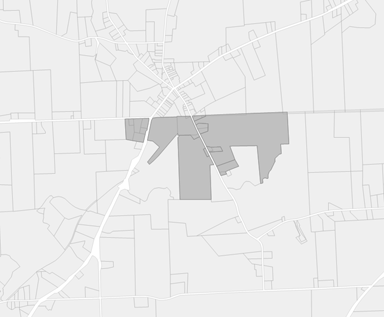
Parcels which include the Town of Dryden portion of the hamlet of McLean as defined by the Draft Comprehensive Plan.
Without the two largest parcels, which total around 125 acres, that leaves 44 acres of developed area. McLean had 135 housing units, which divided by 44 acres produces around 2.8 units/acre.
John Southworth
George Goodrich's Centennial History of Dryden includes a number of biographical portraits of people Goodrich deemed especially important. The name of one of his subjects, John Southworth, is still remembered through both a library and a road in the southeast of Dryden. Goodrich makes plain his importance, but also paints a portrait of a remarkably cantankerous and determined businessman.
Chapter XLVII.
John Southworth
The subject of this chapter impressed those who personally knew him as a man of no ordinary ability. His long life, extending throughout a large portion of our Century Period, during which he accumulated a princely fortune, had a marked influence in the town of Dryden. He was born at Salisbury, Herkimer county, N.Y., September 26, 1796, and died in Dryden, December 2, 1877. His ancestors were from Massachusetts, and his father, Thomas, in August 1806, came to Dryden with his family, which included John, then a lad ten years of age.
Thomas, who was a tanner and currier by trade, and a man of moderate means but of exemplary character and habits, first located in Dryden upon a farm of eighty acres which he purchased at Willow Glen. Afterwards he lived with his son at Dryden village, where he died in July, 1863, 91 years of age.
Soon after coming to Willow Glen, young John was sent off some distance with his father's team, which he took the liberty of trading for another. The exchange, like most of his dealings in after life, proved a fortunate one, but his father was greatly displeased that his son should have taken such unauthorized liberties with his property, and reproved him severely, predicting certain disaster as the result of such precocious tendencies. When John was twenty years of age, he married Nancy, a daughter of Judge Ellis, and purchased fifty acres of land adjoining the farm of his father. He was then obliged to borrow the money in order to pay for a pair of steers with which to do the team work on his farm. After a few years he sold out his first purchase of land and bought the farm in Dryden village which afterward became his homestead. In these early years he developed a remarkably quick and accurate judgment as to the value of property, which followed him through life and enabled him to acquire a fortune, while others, with the same surroundings and with more toil, barely made a living. In a dozen years from the time of his start in business for himself, he was worth as many thousands of dollars.
His first wife died March 16, 1830, while he was living in the house where Will Mespell now resides, on East Main Street in Dryden village. By her he had five children, viz: Rhoda Charlotte, who died December 14, 1847, having become the first wife of John McGraw and the mother of Jennie McGraw-Fiske; Sarah Ann, who became successively the widow of Thomas McGraw; Henry Beach; and Dr. D> C. White, and who is still living at an advanced age in New York city; John Ellis, who became a successful man in business, but who died in early manhood in New York city without issue; Nancy Amelia, the second wife of John McGraw; and Thomas G., who married Malvina Freeland and still lives at Rochelle, Ill. John Willis and his children are the only descendants of Thomas G., and the only living descendants of John Southworth by his first wife.
In 1831 he married Betsey Jagger, by whom he had five children, viz: Betsey Fidelia, who died in youth; Rowena, who became the wife of Hiram W. Sears, and the mother of John Sears, formerly district attorney of Tioga county, N. Y. now a lawyer of Denver, Colorado, and died October 9, 1866; Charles G., who died unmarried in 1872; William H. Harrison, who married Ella Ward and died in 1885, leaving a family of three children; and Albert, who married Diantha Bissell, and died in 1886, leaving a family of three children.
In November, 1833, Mr. Southworth engaged in the mercantile business with Thomas McGraw, afterwards his son-in-law. In 1836 he built the original brick store on the corner of South and West Main streets and in the same year his brick house on North street. He early experienced some business misfortunes, but his dealings were on the whole very successful. The purchase of a large tract of pine lands in Allegany county in partnership with his son Ellis and his son-in-law, John McGraw, was one of his most successful investments. The bulk of his wealth, however, was not made in large transactions, but in the careful, constant, shrewd management of small affairs, out of which his genius derived profits when others would have failed.
To the writer, who had some personal intercourse with him in his declining years, John Southworth was a very interesting character. Having no business education except that acquired from common experience and observation, and no schooling except of the most rudimentary kind, he would express himself clearly in unpolished but forcible and terse language, and would write out with his own hand a contract which, for precision and completeness, few lawyers could equal. Of a genial and social nature, he could tell a good story as well as make a good bargain. He was kind-hearted as well as penurious and one of the anecdotes of his career so fully and correctly illustrates the combination of these somewhat conflicting qualities that we feel compelled to insert it here, as follows: In his dealings with a shiftless, unfortunate man who lived in the South Hill neighborhood, he took a mortgage on the poor man's only cow to secure the payment of what was due him, which was about equal to the value of the animal. Receiving no payments, he came to the conclusion that the only way in which he could collect what was justly due him was to take the cow on the mortgage. Convinced of this, he started out one morning with a boy to assist in bringing home his property. Arriving where the man lived and finding the cow in the door-yard, he directed the boy to let her out into the road while he went into the house and made known with his business. The man did not appear, but his wife came to the door with her little children following and clinging around her. She said to Mr. Southworth that her husband was away and that the cow was all that she had left with which to feed her little ones. Bursting into tears she continued, saying that if the cow was taken from her she should die in despair. Mr. Southworth stood at the door listening to her statement, while the children cried in sympathy with their mother, until he, too, commenced to weep. The boy, who was driving out the cow as directed, seeing the situation, hesitated, suspecting that feelings of sympathy would overcome Mr. Southworth's first intentions; but he was mistaken, for, observing the delay in carrying out his instructions, Mr. Southworth dashed the tears from his eyes and, calling to the boy in a severe tone, he said: "Why in h--l don't you drive along that cow?" The firm determination to have what belonged to him overcame his sympathetic impulses, which were also strong. The cow was legally and equitably his property and, as he considered it, he paid in large taxes his full share toward the support of the poor.
While Mr. Southworth never held any public office, his time being fully taken up in his many business interests, to all of which he gave his own personal attention, he was not insensible to his public duties as a private citizen. When volunteers were being called for during the dark hours of the War of the Rebellion, he contributed at one of the war meetings five hundred dollars for the aid of the families of those who should go to the front. When the question of building a railroad, which resulted in securing to Dryden the Southern Central branch of the Lehigh Valley, was being agitated, and other more narrow-minded property holders refused their aid, he was a liberal contributor to its stock, which was then of very doubtful value and afterwards of none at all.
While he was not known as a religious man, and, in his forcible use of language, was quite often profane, the church people of the village did not apply in vain for his assistance in their financial affairs. He was at one time pursuaded to attend one of the meetings of the M. E. church society, the object of which was to raise funds with which to enlarge and repair their church edifice. Bishop Peck, who, in his youth, was one of the first M. E. clergymen located at Dryden, and with whom Mr. Southworth had thus formed an old friendship, was present at this special meeting to raise funds for the church. After Mr. Southworth had consented to subscribe one hundred dollars, the bishop, minister, and church members endeavored to obtain smaller contributions from those of less ability. In this effort Mr. Southworth readily joined, finally offering to contribute fifty dollars more if John Perrigo and another man would sign for twenty-five dollars each, which would thus add another one hundred dollars to the fund. When the others hesitated, Mr. Southworth, in his earnestness to carry out the scheme and unmindful of the company he was in, said: "Why, d-mn it to h--l, Perrigo, you can do that much." It is needless to say that the bishop and church members who surrounded him did not severely rebuke him for his strong language upon that occasion.
While Mr. Southworth was a man of strong will, which would bear no contradiction, he was not altogether heartless or unreasonable, and he always manifested a disposition to help those who were inclined to strive to help themselves. Unmerciful to those who were unfaithful to their agreements with him, there was no limit to the confidence which he placed in those by whom he thought confidence was merited. While extremely simple and economical in his personal habits, his hospitality was unbounded. His faults were for the most part on the surface, and of his better qualities he made no display. Notwithstanding the rapid decline in the value of his real estate shortly before his death, his accumulated property inventories nearly a million.
Goodrich, George B. The Centennial History of the Town of Dryden, 1797-1897. Dryden: Dryden Herald Steam Printing House, 1898. Reprinted 1993 by the Dryden Historical Society. Pages 208-12.
(The Dryden Historical Society, which sells this book, may be reached at 607-844-9209.)
More buildings on 366
It's cold and wet tonight, but it was a lovely sunny day when I took these.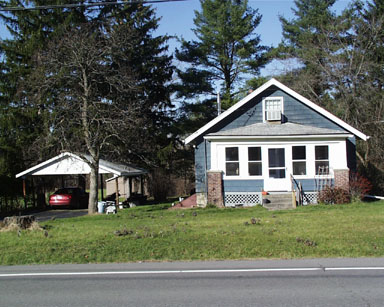
1132 Dryden Road (map)
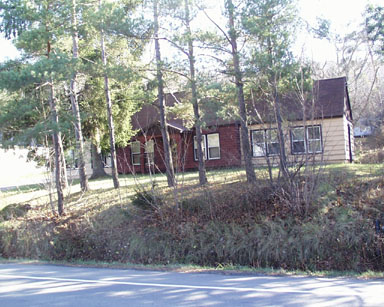
1129 Dryden Road (map)
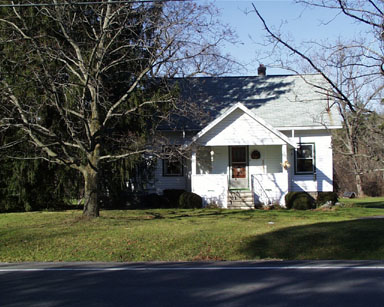
1128 Dryden Road (map)
March 8, 2004
The Dryden Lake area in the 19th century
The Dryden Lake area today has farms, parks, trails, and a golf course, but it used to be a lumbering and milling area before settling down to farming and (long since gone to refrigeration) and ice-making. George Goodrich explores the southeastern corner of Dryden in this excerpt from his Centennial History.
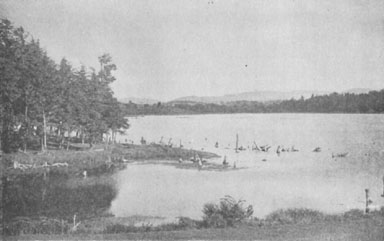
Dryden Lake (1897, Photo by Silcox)
Chapter XLI.
Further History of the South-East Section
This corner of the township includes Dryden Lake, of which a view has already been given at page 3 of this volume. It is located in a good farming locality near the summit which divides the streams which flow southerly into the Susquehanna from those which flow northerly into the St.Lawrence system of watercourses.
James Lacy, the youngest one of the five brothers who came to Dryden from New Jersey in 1801, was the first to settle near its shores, and he soon built a dam at the outlet, thereby enlarging its natural capacity and furnishing power for a saw-mill which he soon constructed for the purpose of manufacturing lumber from the abundance of pine which was there found. At one time five saw-mills were operated upon the outlet flowing from the Lake before Dryden village was reached and at least one saw-mill existed at the head of the Lake upon its inlet.
Some species of fish were found naturally existing in the waters of the Lake when first discovered, but others, including pickerel and perch, were afterward introduced and have multiplied, furnishing excellent fishing for an inland town, which is appreciated by the inhabitants for many miles around. A number of flat-bottom boats are kept and rented by the proprietors of the Lake for fishing purposes and are in great demand annually from the fifteenth of May, when the fishing season begins. For some years past the saw-mill at the outlet has been allowed to run down for the want of raw material and the only use made of the Lake except for fishing and pleasure parties has been the ice harvesting industry, which has developed within a few years into an extensive business in its season. A large storage ice-house has been erected on the bank near the railroad by the Philadelphia Milk Supply Company, and at the proper season large quantities of ice are harvested and stored or shipped at this point, which combines the advantages of a high altitude, pure lake water, principally derived from springs in the neighborhood, and convenient transportation.
In this connection we are obliged to chronicle an event which happened in this locality December 18, 1887, the murder of Paul Layton. He was a farmer who had formerly lived on Long Island, near New York, and had lived in Dryden quite a number of years, owning and occupying a large farm to the northeast of the lake. Of a somewhat miserly disposition, employing only cheap help with whom he lived, and having no family of his own, Mr. Layton had acquired considerable property and was frequently known to carry a good deal of money on his person. At the time of his death in the winter time he had no one living with him and he was chiefly employed in caring for his stock, which required his assistance about the barn, situated in a secluded location some little distance from the highway. Here, on the morning of December 18, 1887, he was found with his skull broken, evidently from the effect of blows upon the head, but with no evidence as to who had committed the crime. His pocketbook, in which he carried his money, was gone and it was concluded that money was the incentive which influenced the villain to commit the deed, but although great efforts were made to investigate the matter, no satisfactory proof as to who committed the act was ever obtained, and it seems likely ever to remain an unsolved mystery.
Of the pioneer families of this section we can only mention:
BAILEY, JESSE, who, with his son Morris, bought thirty acres of land on Lot 56, upon which they were living as early as 1804, being a part of the farm now owned and occupied by Cyrus Tyler. Morris Bailey is named among the original members of the Baptist church of Etna in 1804 and he was the father of the Bailey brothers for so long a time residents of Dryden village but only two of whom, Wm. and Amasa, now survive.
CARPENTER, ABNER, whose deed of about three hundred acres of land on Lot No. 70, near the head of Dryden Lake, bears date March 17, 1804, was among the very earliest settlers in that part of the town where some of his descendants still reside. There seems to have been a controversy between him and Jacob Hiles at the foot of the Lake as to some rights connected therewith and among his papers we find the bond of Jacob Hiles, executed December 3, 1814, according to which they agree to submit to John Ellis, Jesse Stout, and Joseph Hart all of the matters in controversy.
Of the children of Abner Carpenter, Laura marries Wm. Tillotson; John moved to Cortland; Harry moved to Illinois; Barney remained in Dryden, where he died in 1892; Daniel moved to Groton; Polly married Henry Saltsman and went West; and Candace married Jarvis Sweetland.
DEUEL, REUBEN, was a Quaker and an early settler on Lot No. 76, in what is now known as the Dusenberry neighborhood. He was a shoemaker and came to Dryden from Orange county, N. Y., about 1806. We have already referred to him as one of the traveling shoemakers who in those days went about from house to house among the farmers making up their home-made leather into boots and shoes.
He was the ancestor of the Deuel families of Dryden and Caroline, which have intermarried with many other families, and T. S. Deuel, of Dryden village, is his grandson. His children included Morgan, Lyman and David Deuel, and Mrs. Thos. Freeman, of Etna.
HEMMINGWAY, DEACON SAMUEL, about the year 1810, bought and cleared up the farm now own by Cyrus Knapp on Lot 65. He has already been mentioned in connection with Etna as one of the founders of the Baptist church there in 1804.
HOLLISTER, KINNER, a few years later, about 1813 or 1814, settled on Lot No. 85, clearing up the farm now in possession of his grandson, Frank Hollister.
HILES, JACOB, with his sons John and George, came from New Jersey early in the century, purchasing the Lake mill property of James Lacy before 1814. John succeeded to this property, upon which he resided for many years and finally died, leaving a large family and considerable property. The widow of Jacob became the second wife of Judge Ellis. George Hiles married Percy West and was the father of Harrison and John W.
POWERS, ELIJAH, settled on Lot 86, where Chauncey L. Scott lived years ago. He was there as early as 1807 and in 1808 he built a saw-mill called the Bottom Mill, which passed into the possession of the Van Pelts many years later. This was the first saw-mill built on Upper Six Mile Creek and antedated others at Slaterville.
RUMMER, GABRIEL, came to Dryden and located in this section in the year of the total eclipse (1806) and left children which included Anne (Stevens), Levi, Polly (Purvis), Lydia (Ballard) and Phoebe F. (Joyner). Peter Rummer, who owned the farm now know as the Rummer farm in Dryden village, and his son Cyrus were of another family.
SIMONS, BENJAMIN, was born January 29, 1766, and came to Dryden from Orange county, settling upon South Hill in 1808 with five children and his wife, Isabelle McWilliams, who was a native of Scotland.
Of the children, John and James went later to Allegany county; Andrew to Pennsylvania; Jane married the Rev. Reuben Hurd, an early minister of the Presbyterian church in Dryden village, and they afterwards moved west; Sarah married Edwin Cole. Benjamin, Jr., the old gentleman who recently died here, had remained in Orange county until after his marriage, and Adam was born after his parents came to Dryden, the former being the father of our Andrew Simons and his sisters and the latter of Nancy, Luther, Henry, and William. Benjamin, Sr., was a devoted pioneer in the Presbyterian church of Dryden and went on foot to Orange county about 1820 to secure aid for the completion of its building.
SMITH, WM. R., came to Caroline in 1816 and cut a road from Norwood's Corner to the Pumpelly lot, No. 100. He cleared sixty-five acres, upon which he built a log house in 1820. His father had served in the War of 1812 from Massachusetts, and he was the oldest of a family of seven children, all of whom came to this section of country. He had married in 1818 Polly Vickery, and to them were born thirteen children, which include Cynthia O'Cain, who lives in Iowa; Betsey Amy and Hannah Eastman, who have died; Mary Ann Schutt; Adelia Whitman; Clara Quick; Sarah Huslander; Frances Oak; and Ellen Cinderella. Two boys, William R. Smith, Jr., who recently died, and Gilbert, who is living, have children who reside upon and near the old homestead in the extreme south-east corner of the township. The old gentleman died September 30, 1881, 83 years of age.
Goodrich, George B. The Centennial History of the Town of Dryden, 1797-1897. Dryden: Dryden Herald Steam Printing House, 1898. Reprinted 1993 by the Dryden Historical Society. Pages 180-4.
(The Dryden Historical Society, which sells this book, may be reached at 607-844-9209.)
Spring thaw is over
David Weinstein writes again to report the effect of all that snow melting from our hillsides:
After reaching a peak flow of just over 2000 cubic feet per second (cfs) on Friday night (March 5, 2004) and remaining there for most of Saturday, the Fall Creek water level dropped almost in half by mid-day Sunday (to approximately 1200) and today (Monday, March 8, 2004, 7AM) is down to 895.
Examining spring thaws (defined as the peak flow in Feb-April of each year) through history (since 1925), I found that this year's flow was just slightly over average. Over the last 80 years, 47 springs have had flows less than 2000 cfs, with 33 having flows greater or equal to 2000 cfs. Only 11 years have had flows greater than 3000 cfs, and of those only one had a flow exceeding 4000.
Peak Flow (Cubic Feet/Second) Number of Years Cumulative % less than 1500 27 34.18% 1501-2000 20 59.49% 2001-2500 15 78.48% 2501-3000 6 86.08% 3001-3500 5 92.41% 3501-4000 5 98.73% More than 4000 1 100.00%
Personally, I'm happy to have avoided last year's spectacle of my back steps turning into a small waterfall.
Meetings this week
The Town of Dryden site lists two meetings this week. On Tuesday, March 9, the Conservation Advisory Council is meeting at 7:30pm, while the Town Board is meeting on March 11, at 7pm.
The agenda for the Town Board meeting is available, and starts with a public hearing on a law to convert the Conservation Advisory Council into a Conservation Board, detailed in last month's minutes. (Search for "Local Law No. 4" to find it quickly.)
Both meetings will be held at the Dryden Town Hall (map).
March 9, 2004
Absentee ballots, healthy food in ICSD
The Ithaca Journal reports that today is the last day to apply for an absentee ballot for the Freeville or Dryden village elections, though ballots may still be picked up in person until March 15 from the Board of Elections.
Also in today's Journal, in the Ithaca City School District, the Food Service Program is offering healthier lunches for children.
Missed a building on 366
In my last entry on buildings along 366, I skipped this one, at 1131 Dryden Road.
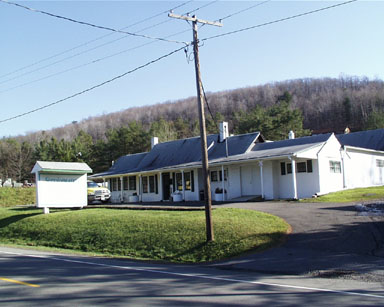
1131 Dryden Road, Servicemaster (map)
I've given some photos of businesses names reflecting the business, which pulls them out of the main address listing. I'll check my notes more carefully in the future.
March 10, 2004
Dryden busing, ICSD budget, vaccinations, Corinthians
Today's Ithaca Journal notes an April 1 deadline for Dryden Central School District residents seeking buses to non-public schools and a report from the Intermunicipal Recreation Partnership, and examines what next year's Ithaca City School District budget would look like if held to a 5% tax levy increase.
On the opinion page, Dr. William Klepack of Dryden Family Medicine (and medical director of the Tompkins County Health Department) has a guest column on the importance of vaccinations, while Arthur Barry of Dryden reminds readers of 2 Corinthians 2:15.
Dryden school board updates
Today's issue of The Shopper includes the latest Dryden Central School Board Briefs, as well as a notice looking for candidates for the May 18 school board election.
If you want to run, you have to have lived in the district at least a year, can't share a household with another member as a member of the family, can't be employed by the school board, can't have been removed from school district office within the past year, can't hold "another incompatible public office", must be able to read and write, and must be at least 18 years old.
After all that, there's another step to getting on the ballot:
"Candidate petitions with 31 signatures are due in the District Clerk's office by 5:00 p.m. on Monday, April 19, 2004"
Candidate packets are available from Linda Carr, the District Clerk, at 844-5361, extension 225.
SPCA closer to completion
The SPCA expansion is starting to look more like a building and less like a work in progress.
March 11, 2004
Dryden teachers rally; fact-finder's report recommends compromise
The Ithaca Journal reports this morning that members of the Dryden Faculty Association rallied to remind passers by that they have worked nearly two years without a contract, just as a fact-finding report, submitted Monday, suggests that both the District and the teachers need to make concessions.
The union will be holding an informational meeting on the fact-finder's report this afternoon, and the school board will be discussing it Monday. Superintendent Patricia Archambault sounds hopeful about the prospects:
"The report lends itself to moving toward a settlement, but there needs to be a willingness by both parties to work at it," Archambault said. "I'm very optimistic that we'll see some movement to closure in the not-too-distant future."
The Journal also reports today on a presentation at TC3 on the dangers of DWI.
Update: This originally said Dryden teachers had worked nearly nine months without a contract. That was based on the Journal's quoting Mary Ellen Bossack that "the purpose was to make the community aware that it's been 260-odd days without a contract," which they have now corrected to 620 days.
March 12, 2004
Town votes 3-2 for annexation
Settling the division on the board over annexation of a parcel to the Village of Dryden, Supervisor Steve Trumbull voted for annexation.
A lot happened at last night's Town Board meeting, and I'll be reporting it in detail over the next few days, but meeting highlights are available in today's Ithaca Journal.
March 13, 2004
Home and Garden Show at NYS Armory
The Ithaca Journal has a picture from the Home and Garden Show this morning. The show, which is being held at the New York State Armory on Hanshaw Road (map), opened yesterday and is open today from 10am-6pm and tomorrow from 11am-4pm. More details are available at the show's web site.
Dryden village candidates
There's an article examining the contested Village of Dryden race for a one-year term as trustee in today's Ithaca Journal, speaking with both Democrat David Potter and Republican Robert Witty.
Witty, who was appointed to fill the seat when Michael Hattery left for the Town Board, cites his financial experience as CEO and president of CFCU Community Credit Union as a major qualification.
Potter raises issues affecting the Village directly, notably underfunding of public services and the quality of housing: "Many rentals are substandard or close to it, especially on safety standards." (As noted here earlier, the 2000 census found 43% of Village of Dryden rentals were built prior to 1939.)
Both candidates seem concerned with intermunicipal cooperation as a way to reduce costs. (Two incumbents, Republican Dan Wakeman and Democrat Mary Ellen Bossack are also running for trustee, but in uncontested races for two year terms.)
The article also includes a sidebar on uncontested races, noting Freeville's shifting of mayor and trustees and addition of a new member.
Request for information on schools, history
Elsie Gutchess has a letter in the Cortland Area Tribune:
To Area Senior Citizens,
As we speedily move along in the 2000s, I am always interested in hearing personal recollections of bygone times from within the Town of Dryden.
Many of you have already made contributions to the still-unpublished manuscript that will become the 2nd Centennial History of our Town. That larger-than-anticipated project is scheduled for publication in 2005.
If enough additional interviews and material can be collected, a publication on the "Schools of the Town of Dryden" is expected also in 2005. That will include and cover each of the Rural Schools, as well as GJR, Freeville, and Dryden schools. Some rural schools were just outside our town lines, but were attended by Dryden families. If possible, they will be included.
If you have stories or memories about early school or community events, businesses, farm life, families, reunions, etc., and would be willing to be interviewed, please call me. I can come to you or meet you somewhere else, at a time that is convenient for you.
As the Historian for the Town of Dryden, I am charged with gathering and preserving the history of our entire town. I need contributions from you long-time or long-ago residents who each hold a little piece for this big assignment. All together, we can recapture the past and save the story for future residents.
Please contact me at your convenience. My phone is 607.844.5504. Write me at Box 555, Dryden NY 13053. Or email me at drydentownhistorian@cny.net.
- Elsie Gutchess
Town Board on annexation
[This Thursday's Town Board meeting had enough to it that I'm going to publish a series of articles on what happened, focusing on specific topics, rather than try to cover it in one huge piece.]
The Town Board resolved the annexation issue this Thursday, voting 3-2 in favor of findings proposed by Mike Hattery that put annexation in a much more favorable light than the findings proposed by Mahlon Perkins in Febuary.
Fred Apker, who has a parcel next to the parcel being annexed, spoke during the citizens' privilege period. He said:
"I think it's inappropriate, and it shows poor planning by our town. To just take one sliver of land out of a parcel... I feel is inappropriate to be annexed. If the entire Cortland Road sewer district were to be annexed, or if there were roads or something that divided it up, that would be appropriate.
As far the DOT going in, I realize that we're not talking about that tonight, but it seems like that's the sole usage of that property. I just can't see, with the kids walking by the schools, having all those tractor-trailers driving by, etc. I feel that that particular parcel is inappropriate. I think with excellent planning somewhere around Hanshaw Road, where there are a lot of accidents, where the plows and the sanders are needed, and that would be more centrally located."
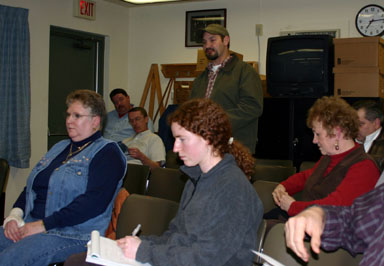
Jamie Arnold addresses the Town Board
Jamie Arnold, a DOT employee, spoke in favor of both annexation and of putting in the DOT facility:
"As a lifelong resident of Dryden and a New York State Department of Transportation employee, I can see both sides of the fence and I can understand the pros and cons.
I really look forward to having the Department of Transportation building here in Dryden, for the sole fact that my wife and kids will have a lot cleaner roads to drive on. The ability of the Department of Transportation to take care of the roads with a newer facility, with a cleaner facility, in a nice area like this, is second to none.
Where I think we're really missing the boat here is if we're worried about traffic when there are so many things that could be dealt with simply by rerouting traffic and making sure that any heavy truck traffic for the Department of Transportation gets access from the Route 13 side. There are so many simple little answers to these things that everybody's so upset and so worried about.
There are a lot of people who work for the state Department of Transportation that don't live in Dryden or in this immediate area. Spencer, the other side of Homer, Tully, Preble, that will most likely relocate here, and that's going to do a lot for our bedroom community and our tax base.
Every time you're at work, and you need something done on your motor vehicle, you'll do it, and catch a ride from one of our friends or something going to work, we drop our vehicle off on the way in or catch it up on the way back, and that's all going to be done in town now, as is all the stuff you do on your way out of town, getting gas and things like that.
There would be an increase in activity at all of our local stores, and all of our local markets as well. I really hope we can understand all the pluses that are coming with this."
After Arnold spoke, the board moved to the Annexation vote. Michael Hattery introduced his set of findings on the annexation, and Steve Stelick seconded them. In the discussion, the board's earlier division remained, with Stelick and Hattery supporting the annexation and Christofferson and Michaels opposing it.
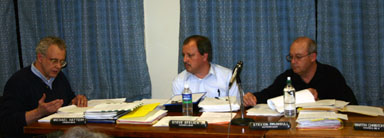
Councilman Hattery reads his proposed findings on annexation
Michaels, while noting that "I'm not opposed to annexation in general," was unhappy with annexing a single parcel in a largely unplanned "spot" annexation. Christofferson, agreeing with Michaels, felt that the board should look at this in a larger context rather than moving forward with a "surgical" annexation. "Since this is one small piece of a larger problem I think we should be looking at, I'll be voting against this."
Michaels noted that it was "the two members who came to the Town Board from the Planning Board" who opposed annexation, though Hattery noted that he had once been on the Planning Board as well.
Stelick noted that this annexation project would get village water across Route 38, opening new possibilities, and that state money, gathered by Senator Seward, was available for the project - but that the money wouldn't be available forever.
After the discussion, Michaels and Christofferson voted against annexation, and Supervisor Trumbull (who hadn't spoken during the discussion, and handed over the reigns of running the meeting to Deputy Supervistor Stelick because of a cold) voted for it. Joined by Stelick and Hattery, as expected, that put the annexation measure over the top.
March 14, 2004
Highway discussions at Town Board meeting
Thursday's Town Board meeting had a relative brief highway session, though what there was was interesting.
During citizens' privilege, Peggy Walbridge asked what the status was of the proposed work on Hunt Hill and Genung Roads. Highway Superintendent Jack Bush said that nothing had changed, planning was still in the works, she would be notified when something would happen, and that nothing should happen before the next board meeting, certainly.
Bush also reported on the February 24th meeting in Varna on "Speed Control on Rural Roads", noting that many of the difficulties discussed there were in state control, but also noting that some people were interested in putting a park and ride on 366 to take traffic off the road before it reached Varna.
He also noted (and County Legislator Martha Robertson also noted, as she had worked on it previously and been involved in the discussion) that one complaint at that meeting focused on town roads was about the intersection of Genung and Ellis Hollow Creek roads (map), which was wide enough that drivers took turns quickly and regularly ended up in the yard across the street.
The town is experimenting with narrowing the intersection, as shown below:
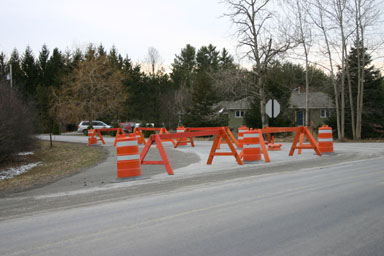
Revised intersection of Ellis Hollow Creek and Genung Roads, as seen by drivers approaching from Ellis Hollow Creek Road
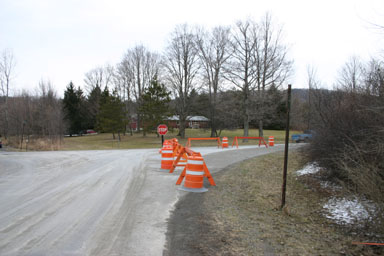
Revised intersection of Ellis Hollow Creek and Genung Roads, as seen by drivers approaching from Genung Road
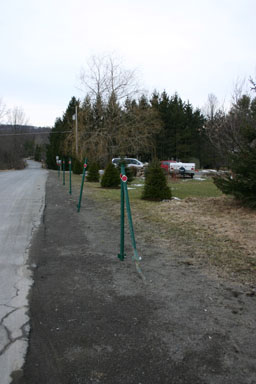
Damaged reflector at Ellis Hollow Creek and Genung Roads, an earlier effort at marking the road edge that itself got hit.
Board members reported that they'd heard positive reports from citizens about the modified road, and it seems to be a success so far.
Martha Robertson noted that her efforts to have the speed limit reduced on Ellis Hollow Creek Road were stymied by a New York State Department of Transportation official who feared it would lead to tailgating. Robertson also discussed the prospects for Route 366 park and ride, noting that Cornell's parking situation is difficult to start with and that putting a park and ride at the current site of the closed Boxcar restaurant might solve both traffic problems on Route 366 and parking problems at Cornell.
March 15, 2004
Conservation, environmental planning, and a golf course
Conservation issues were important at Thursday's Town Board meeting, which started with a (very quiet) public hearing on changing the Conservation Advisory Council to a Conservation Advisory Board, spent time on environmental planning issues, and concluded with a discussion about purchasing an enormous parcel, a golf course, on Dryden Lake, for reasons that may have something to do with conservation.
No one spoke on the Conservation Advisory Council/Board proposal during the 7:00 to 7:15pm public hearing time, though Charles Smith spoke briefly before voting, noting that he thought it was a good law. Councilman Christofferson expressed concerns for its potential to become additional red tape. After some discussion, and reassurances that this wouldn't affect people putting garages on their houses, during the discussion, the board passed it 5-0.
During the Environmental Planner's report, the board discussed three issues. The first was a question of Town support for a Six Mile Creek water quality monitoring program, initially for training of volunteers, which is starting soon. The project, a joint project between the Town of Caroline, Town of Dryden, Town of Ithaca, City of Ithaca, Cornell Cooperative Extension, and the Community Science Institute had faced and answered some tough questions from the Conservation Advisory Council, and in the end was passed, contingent on identification of a funding source to cover the approximately $2500 cost.
The next issue, county funding of the five-year Virgil Creek Valley aquifer study, promises to reduce town costs on a project that is already in motion. The town had approved the study in July 2002, with the US Geological Survey paying 30% of the costs and the town paying 70%, or $279,000. The county is now able to contribute $139,000, reducing the town's share to 35%. The study should help the town avoid contamination of drinking waters supplies in the future.
The last issue also promised to improve Dryden's finances. The Town of Caroline wants to contract with Dryden for environmental services, sharing Debbie Gross's time. Caroline will pay $7500 per year, and the contract allows Dryden to pull out if it proves to take too much of Gross's time. It was moved and approved.
The Town Board also appointed Gross to the Ithaca Tompkins County Transportation Council and as an alternate to the Cayuga Lake Watershed Intermunicipal Organization
At the end of the meeting, the board considered another issue with potential environmental ramifications, the town's possible purchase of the Lakeview Golf Course on Dryden Lake. As reported earlier in the Dryden Courier, Supervisor Trumbull is very enthusiastic about the purchase, though opinions of other board members were more mixed.
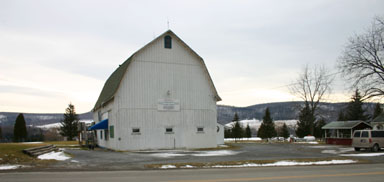
Lakeview Golf Course clubhouse
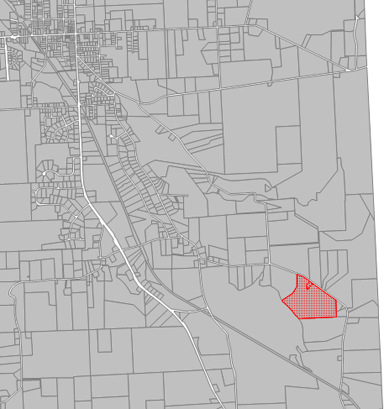
Parcels included in Lakeview Golf Course
Update: A corrected map is available in a more recent story.
The immediate issue was whether to approve a contract with Tallman and Demarest, a local architecture firm, for no more than $5,000 to do a study on the economics of the current golf course. (Supervisor Trumbull also had estimates for similar work of $35,000 from a company in Florida and $8,000 from a company in Syracuse.)
Councilman Hattery stated that "Personally, I am not anxious to see the town running a golf course," and saw the town's role here only as an intermediary. Councilman Michaels was concerned about the lack of connection to existing planning processes. (It is not, for example, included as a possible park in the Draft Comprehensive Plan's Future Park & Transportation Improvements (300K PDF).)
Councilman Stelick said that "I don't want to see this lake disappear behind that growth. " Councilman Michael noted that he didn't want to see housing there, but he was "very resistant to keeping someone who paid cold hard cash for it from building houses on it."
Charles Smith suggested that this was something the Conservation Advisory Board could take a look at, and Supervisor Trumbull seemed interested, though no formal request was made at the meeting.
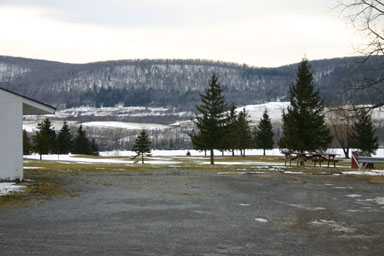
View of Dryden Lake from Lakeview Golf Course
On the strength of Councilman Michael's suggestion that "not doing this now means not having the information we need when it's time" - and given that time was short, as the course is now in foreclosure, with an auction likely in early summer, the board approved going ahead with the study.
Dryden fire departments at Rose Inn fire, SPCA spaying
The Ithaca Journal has had two articles on the fire which gutted the Rose Inn in Lansing and the investigation into its causes. The Dryden, Etna, Freeville, McLean, and Varna fire companies were among a dozen departments on the scene.
Also in today's Journal, the SPCA is offering free spaying of cats to low-income Town of Dryden residents.
Today's Dryden Town Talk explores a Dryden resident's unexpected flood of recipes for salt rise bread, as well as contra dancing, soccer, and lacrosse programs from the Town of Dryden Recreation Department.
Today is also the last day to order seedlings, transplants, bulbs, fertilizer, and duck, bat, and bluebird nesting boxes from the Tompkins County Soil and Water Conservation District.
Dryden Courier on fire company audits
The March 10 issue of the Dryden Courier has an article on what last year's controversial audits have turned up. Tony Hall reports that Sciarabba, Walker and Company, LLP, have submitted complete audit reports for three of the four companies, the Neptune Hose Company of Dryden, the W.B Strong Company of Freeville, and the Varna Volunteer Fire Company. The firm has finished collecting information on the Etna Fire Department, though as that audit started much later than the others, it has not yet compiled a report.
Hall notes "a plea from the auditors that the three companies standardize their reports, to make it easier for the town to understand their financial positions in the future." Questions related to such standardization of information, especially during the budget process, also came up at the Town Board's January 25th special meeting with fire companies.
The two largest findings are that the W.B. Strong Company hasn't filed a tax return - "'maybe ever', Stelick said," and that Varna had lost between $40,000 and $50,000 in 2002 on investments, as it used a riskier strategy for managing its investments than had, for example, Neptune, which puts all of its money into certificates of deposit. The Varna investments seem to be coming back, and Strong doesn't owe taxes - as a non-profit, it doesn't pay them.
The report finds the companies sound and states that "It appears that major purchase decisions were arrived at only after thorough exploration of options and careful consideration by membership."
The audit also included on-site equipment inspections by Scott Pronti of the Lansing Fire Department, and found equipment to be "appropriate".
The table below summarizes the companies' current financial position.
| Company | Cash and Investments | Replacement Reserves | Long-term debt |
|---|---|---|---|
| Neptune Hose Company | $616,563 | $515,784 | $347,018 |
| W.B. Strong | $381,091 | $371,384 | none |
| Varna Volunteer Fire Company | $413,258 | $367,138 | $306,138 |
Next year's school budgets look tight already
The Dryden Courier's March 10 issue leads with some difficult news about the Dryden Central School District's budget: mandates, inflation, health insurance, and retirement costs could inflict an 8.9% increase in in the budget (and larger increase in the tax levy), even with a zero increase in most budget lines and losing four teachers because of an expiring grant.
The Courier cites district Business Manager Teresa Carnrike as estimating that owners of homes assessed $100,000 in the district would face a $394 tax increase, even after increased assessments and state equalization rates are taken into account. A drop of $300,000 in state aid last year followed by an increase of only $30,000 expected for this year hasn't helped the overall situation, nor does $114,000 in spending required by the No Child Left Behind Act.
The Courier concludes by noting that the board asked adminstrators to cut this proposal by an additional five percent.
The Ithaca Journal reported similar though slightly less dreadful budget difficulties for the Ithaca City School District a few weeks ago. (You should make certain to read the correction as well to get the numbers straight.) While the Dryden rollover budget would increase the tax levy 18.44%, the ICSD's rollover budget only increases the tax levy 6.8%. Still, even keeping the tax levy increase to 5% means $950,000 of cuts to currently funded programs and services.
March 16, 2004
Village elections today
Elections will be held in the Villages of Dryden and Freeville today from noon to 9pm.
In the Village of Dryden, voting will be on the second floor of the Village Hall (map). In the Village of Freeville, voting will be at the Village Hall (map).
As noted earlier, Dryden's election is contested, while Freeville's is not.
More on school board budgets, affordable housing
Today's Ithaca Journal has stories on budgeting at both the Dryden Central School District and the Ithaca City School District. As noted yesterday, the Dryden district's budget looks especially bleak:
"Last year when we said we'd keep it to 10 percent [tax levy increase], it seemed possible. This year the effect of the 10 percent, I think, will ruin our schools," said Donna Mott, vice president of the board.
The Journal details the cuts involved:
The proposed cuts included 8.5 faculty positions, 5.5 support staff positions, $55,100 from athletic programs, $92,000 from co-curricular activities such as bands, plays and clubs, $16,399 from the computer tech department, the $15,425 travel and conferences budget, $4,980 from field trip transportation, $25,000 from transportation by no longer offering bus service to 6- to 12-graders who live within 1.5 miles of the school, and $2,653 from supplies, which is equivalent to 1 percent of supplies districtwide.
The board asked the adminstration to come up with budgets reflecting a 15% tax levy increase and also a contingency budget with an increase of 3.61% - which would be used if voters didn't approve the budget.
The Ithaca district will be having a meeting about the budget today, though it doesn't sound like anyone is looking forward to it.
The Journal also has a lot of material on Tompkins County's affordable housing issues today, including information on possible federal cuts to housing subsidies, comments from local residents on the issues involved, and the Town of Ithaca's unanimous approval of a zoning change for the Overlook at West Hill project, which includes 128 affordable units and 15 market-rate homes.
Ellis Hollow Community Church to close
Today's Journal reports that the Ellis Hollow Community Church will be closing in June, as the church needs a new roof and paint while facing dwindling attendance.
March 17, 2004
Schools testing, budgets, taxes
Today's Ithaca Journal has an extended article on schools looking forward to tomorrow's state test results, and opens with discussion of Dryden Intermediate School's fourth grade.
There's also a piece on the Ithaca City School District's budget plan, which currently includes a tax levy increase of 5.82%, though a tax rate decrease of about 4%, reflecting increased assessmements.
On the tax front, the county legislature, including all three Dryden legislators, voted down a county mortgage tax 11-3.
Dryden and Freeville village election results
The Journal reports that unofficially, 211 people voted in yesterday's Dryden village election and 21 voted in Freeville's uncontested races.
In the Village of Dryden's only contested race, Republican Robert Witty defeated Democrat David Potter 132-76. In the uncontested races, Republican Daniel Wakeman received 121 votes, while Democrat Mary Ellen Bossack received 95.
In the Village of Freeville, incoming mayor Lotte Carpenter received 20 votes. Outgoing mayor Thomas Lyson received 18 votes for a one-year trustee seat, while Diana Radford and Penny Beebe both received 21 votes.
Song to a fair young lady, going out of the town in the spring
The first verse of this poem, written by Dryden's namesake, the poet John Dryden (1631-1700), seems especially appropriate as we approach the first official day of spring, but switch suddenly from mud with a few flowers starting to grow to seven inches of snow on the ground.
Ask not the cause why sullen Spring
So long delays her flowers to bear;
Why warbling birds forget to sing,
And winter storms invert the year:
Chloris is gone; and fate provides
To make it Spring where she resides.Chloris is gone, the cruel fair;
She cast not back a pitying eye:
But left her lover in despair
To sigh, to languish, and to die:
Ah! how can those fair eyes endure
To give the wounds they will not cure!Great God of Love, why hast thou made
A face that can all hearts command,
That all religions can invade,
And change the laws of every land?
Where thou hadst plac'd such power before,
Thou shouldst have made her mercy more.When Chloris to the temple comes,
Adoring crowds before her fall;
She can restore the dead from tombs
And every life but mine recall.
I only am by Love design'd
To be the victim for mankind.
Dryden's poetry seems like a stark contrast with most of what I publish here. I wonder what he'd think of this place named after him. (He's not quite so distant as many of the Roman and Greek namesakes of places in upstate New York, certainly.)
Health insurance for elected officials
Another issue that came up at the Town Board meeting last Thursday was the question of health insurance for full-time elected officials: the Town Clerk and Highway Superintendent.
The town pays the full cost of either single or family health insurance for appointed employees, but only the single cost for full-time elected officials. The elected officials can use the family plan, but have to make up the difference themselves, which comes to $159 per week. As Highway Superintendent Jack Bush noted at the February meeting, this effectively makes the Deputy Highway Superintendent better paid than the Highway Superintendent.
Town Clerk Bambi Hollenbeck (who doesn't herself currently use the family insurance) did a survey of surrounding towns, as well as a few towns with similar populations and tax bases, and presented the results.
Councilman Marty Christofferson said "it looked to me like we were kind of unique," in treating elected officials differently from appointed officials. Christofferson wasn't, however, "sure how to draft a resolution that does it", and wanted to hear from the town attorney, Mahlon Perkins, before moving ahead with this.
Bush pointed out that elected officials were on the same (Teamsters) health plan as appointed officials, and the only thing the board would need to do is authorize the payment. This raised questions about whether the town pays the full amount for other employees, which it does, without charging the employees a percentage. Stelick noted that other towns charge employees a percentage, and Christofferson noted that TC3 employees pay a percentage. The union contract specifies that, and it's practice at the town for other employees as well. Chris Michaels noted that he's happy board members can get insurance through the town, though the town doesn't pay for their coverage.
In the end, board members sounded like they wanted to take a long-term look at who pays for insurance for all employees, figure out where this would come from in the budget, and consult with Mahlon Perkins before taking action, though Christofferson said "in principle, I agree that full-time elected officials should be treated like full-time employees." Chris Michaels also asked when any such change would take effect if passed - immediately, retroactive to January 2004, or in 2005. Hattery wanted to see cost numbers before voting. Action was held to the next meeting.
There was a question a few years ago, which re-surfaced in the last election, over whether the Highway Superintendent should be elected or appointed. Whatever your opinion on that issue, it seems very strange that health insurance benefits would change as a side-effect of that. While elected officials often do their work with more controversy and more scrutiny brought on by the election cycle, it hardly seems reasonable to deny full-time officials who happen to be elected the same benefits they would have if appointed.
March 18, 2004
School report cards, budgets
Today's Journal reports that New York State issued school report cards yesterday, and the news is mostly good for the Dryden and Ithaca districts:
"Ithaca City School District elementary and middle schools did significantly better on state tests than those the state deems as similar schools around the state, according to Russell. High school Regents exam performance also continued to be strong and consistent across the board.....
In Dryden, the focus will continue to be on middle school performance. Having made strides in fourth-grade test scores -- earning most-improved recognition from the state for its fourth-grade math scores -- the district hopes to bolster eighth-grade performance....
But in the high school arena, Regents scores suggested that any gaps in middle school education are minimized at the high school. In seven of eight available Regents test scores, more than 91 percent of students scored a passing 55 or higher. On the Mathematics A test 82 percent passed."
Dryden Superintendent Patricia Archambault wants to add support for middle school and and ninth grade students, but the Journal quotes her on the difficulties: "Given a tough budget year any staff reductions will really limit our abilities."
The Journal also has an editorial on citizen involvement with the school budget process. Finally, there's a another notice on an April 1 deadline for "residents of the Dryden Central School District who wish to have their children transported to a non-public school."
Tonight's Planning Board meeting
Tonight's Town of Dryden Planning Board meeting will continue to examine the Draft Comprehensive Plan and proposed changes to it. The Draft Comprehensive Plan page on the town's site notes:
The Planning Board discussed the first three topics at its February meeting, however no actions were taken because a quorum was not present. At the upcoming March 18th meeting (Thursday at 7PM), the Planning Board will revisit these first three topics, and hopes to take action on some revisions. As time permits, the next four topics (housing, water/sewer, transportation, and agriculture) may be addressed. The Planning Board continues to welcome all comments in writing regarding the Draft Comprehensive Plan.
The last Planning Board meeting had lots of discussion, but only two members in attendance. The meeting will be held at the Dryden Town Hall (map) at 7pm.
March 19, 2004
Village and school budgets
Today's Ithaca Journal reports on the 11% percent increase in the tax levy proposed in the Village of Dryden, driven by a 7% increase in total spending and reflected in a 4.5% tax rate increase.
Health insurance, retirement, legal, and gasoline costs have increased substantially, as did the need for some salaries to rise to stay competitive. Freeville also reduced their contracted number of hours for Dryden police. Mayor Reba Taylor notes that "we should still be able to operate and give everyone the same services they've always had."
The trustees also discussed the Cortland Road sewer district, which has become a growing source of contention with the town (water and sewer issues were a large part of what drove the annexation debate over the last few months).
The Journal also reports on an Ithaca City School District budget forum, with more details on the cost of benefits and concessions the teachers' union has made for future employees, and prints a letter from Murray Cohen of the Town of Dryden that suggests that "President Bush must be held accountable. If he doesn't have the courage to resign because of his inept leadership, he must be voted out of office in November of 2004."
Cayuga Trails Club hike Sunday
The Cayuga Trails Club will be hiking on Sunday at 1pm, starting from the Liddel Laboratory on Freese Road, between Varna and Hanshaw Road. It's a "Walk, look, and learn" hike, and contact information is available on their site.
This reminds me that I'm working on building an events calendar for activities in Dryden; if you have events you'd like to see listed, email me.
Planning Board meets, modifies Draft Comprehensive Plan
This month's Planning Board meeting had a quorum, unlike last month's meeting, and was able to move forward with changes to the plan, though only two members of the public (myself included) were in attendance.
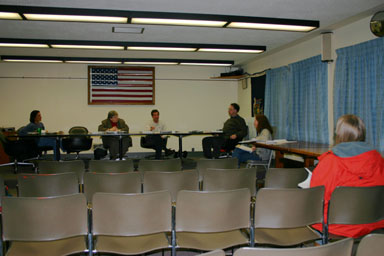
Four planning board members, Dryden's Environmental Planner, and two people attended the meeting.
The Board started with discussion about training possibilities, some on storm water management and others on planning board duties and SEQR review, and talked about the possibility of an April 29th meeting that the County wants to have to discuss the Tompkins County Comprehensive Plan, currently in progress. They also discussed the recent conversion of the Conservation Advisory Council into a Conservation Advisory Board and voted to send subdivision plans on Wood Road and Yellow Barn Road to the CAB for their input.
The Board then picked up on conversations from the last meeting, taking action on ideas that had been discussed before but couldn't be voted on.
After much discussion on the hamlet zoning and how to increase density without changing the hamlets suddenly (in which I pointed out that Varna's population would roughly quadruple, to 2400, if built out the way the current draft of the plan is written) the Board adopted David Weinstein's proposed changes to the hamlet section, with some changes based on conversation at the last meeting, notably:
- A suggestion that zoning be written to put the onus on developers who want to build multi-unit projects to demonstrate that it does fit in the community rather than requiring the board to demonstrate that it doesn't fit
- The use of "floating zones" that permit high-density development but require it to be scattered through the hamlet area
- A few paragraphs will be added to an earlier section of the document encouraging the town to pursue affordable housing through public-private partnerships
These changes to the plan will still allow for increased density in the hamlet areas, but should give the Town more control over how it happens.
There was also discussion about how to encourage owner-occupied housing, though monitoring that is difficult and some recent experiments, notably on Sanctuary Drive in the Town of Ithaca and on Observatory Drive above Varna, seem to be having large problems remaining owner-occupied.
In reponse to concerns that the area south of Mott Road was a wetland, the board extended suburban residential area to the south side of the road, and planned to use the wetland area as a buffer between that residential and commercial area further south.
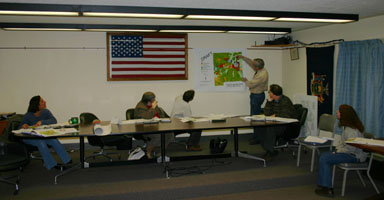
Planning Board members and planner George Frantz modify plans for Mott Road area.
The Etna Industry / Office / Research area, a subject of controversy at last month's meeting, was substantially scaled back, with some portions converted to rural residential and others incorporated into the mixed-use Route 13 overlay. They also noted the existence of the Finger Lakes Land Trust's Etna Nature Preserve there, and suggested that maintaining a woodland buffer between Route 13 and the main portion of the Etna hamlet would be a good idea.
Also, in reponse to concerns voiced at the public meetings, David Weinstein suggested that:
This plan is not advocating the immediate construction of sewer and water into areas like those west of the hamlet of Etna, but rather that they should only go there as development intensifies.
George Frantz noted the cost and risk that "front-loading", building infrastructure in advance of development, can incur. The board approved the suggested change.
The board discussed farm issues briefly at the end of the meeting, noting both a general desire to strengthen language about preserving existing farms and New York State's more active interest in ensuring that municipalities don't make it too difficult for farms to operate. A Ulysses ordinance that made certain to provide for farmers' needs throughout had recently passed muster with the state's Department of Agriculture and Markets, though recent Town of Ithaca ordinances are facing hard questions from both farmers and the state.
March 20, 2004
Looking back at a year of war
Today's Ithaca Journal looks back over the year of war in Iraq, featuring two stories with a Dryden perspective. The easier of the two to read, "Bush's Iraq policy finds support in Tompkins County", includes comments from Dryden resident Richard Jorgenson and Freeville resident Charlie Hart, both supporting the war.
The more difficult article - actually one of the most difficult articles I've seen in the Journal - talks to the parents of Air Force Staff Sergeant Patrick Griffin Jr., who grew up in Dryden, was killed in an ordnance explosion near Diwaniyah, Iraq, and is buried in Willow Glen cemetary.
March recreation report
Jennifer Glaab, Recreation Coordinator for the Town of Dryden, gave a detailed report at last Thursday's Town Board meeting, noting that winter events were wrapping up while spring events are getting started.
Contra dancing was starting up at Varna Community Center on March 14th, followed by Dryden Fire Hall on the 21st, Freeville Fire Hall on April 4th, and Bethel Grove Community Center on April 11th, all from 2:30-4:30pm, $3 per person and $2.50 for seniors and children under 12.
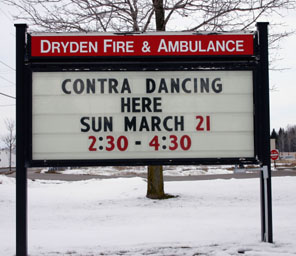
Contra dancing coming to Dryden Fire Hall
The recreation department has also set up a free April 3rd performance of the Shanty Band, from Ithaca College, at Dryden Elementary at 7:30pm, as well as a free Easter Egg Hunt for children eight and under in Montgomery Park on April 10th at 1pm. Neptune Hose Company and Specialty Trophy and Awards are co-sponsoring.
On the 24th of April, and also free, the Pepsi Pitch, Hit, & Run competition will be at the Dryden Middle School and High School fields. (The Dryden Courier notes that 10-year Howie Frisco, of Freeville, won there last year and won at the state level as well.)
Basketball finished in mid-March for both boys and girls. After-school ice skating (at The Rink in Lansing) had 72 attendees. The department was sponsoring a wrestling tournament on the 20th of March, while spring sports are just getting started.
Lacrosse is starting up, with a $25 registration fee, open to 8-year-olds through seventh graders. The Town of Dryden is funding a modified lacrosse program this year, in the expectation that fund-raising will cover this in the future, and the Dryden Central School District is administering it, though it's open to all residents of the Town of Dryden whether they live in the school district or not.
Kiwanis baseball and softball were just getting started, and registrations were still being accepted to April 1. New this spring is an eight-week after-school archery program with Klein's Archery, which costs $80 for one day a week of archery or $150 for two. It runs from April 12 to the first week of June. Children in grades 1-6 can participate. Klein's added the Town of Dryden to its insurance, and Klein's is paying the town $200 - four partial scholarships of $40, and $40 for promotion. The town is also coordinating transportation. Glaab noted that archery was popular on the recreation surveys the town has conducted recently.
County Legislator Martha Robertson asked if Town of Dryden activities were open to non-residents, and Glaab said that they were, at the same fees.
As the March 17 Dryden Courier notes, Councilman Steve Stelick concluded Glaab's report with a huge thank you, noting that "no one could imagine what you could accomplish in a year."
(If you'd like a detailed schedule of recreation events in Dryden, the town site includes a calendar of events, complete with details and forms, as well as a list of events.)
Getting closer to Varna
The last few houses pictured cluster around Oak Brook Drive, and then the houses get sparser, more generally hidden.
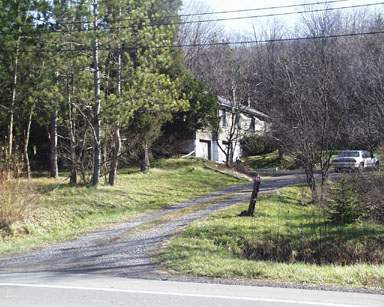
1124 Dryden Road (map)
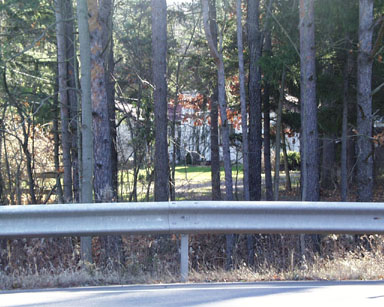
1113 Dryden Road (map)
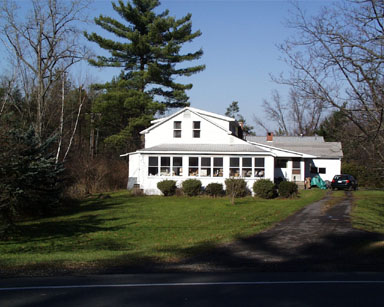
1102 Dryden Road (map)
That bring us to the intersection with Turkey Hill and Monkey Run Roads.
New comments form
It's not much yet, but I've added a form for general comments about the site. Unlike the regular comments for stories, these comments just go to me, and aren't published on the site.
Whether you have suggestions for the site, news or events you'd like announced, or just want to say hello (or good-bye), you can do so now.
Hopefully it's the first small step toward some more interactive features around here.
March 21, 2004
Fire department contracts, audits
Fire department issues came up repeatedly during the Town Board meeting on March 18, ranging from fire hydrant painting to contracts and audits.
Fire hydrant maintentance came up during the engineering report, with questions about painting, flushing, and flow-testing. Much of this work may be done this summer. Bolton Point requires that their active hydrants be painted orange. (There is one black hydrant, in Lansing, used only for flushing the end of a line.) It sounded like the last major testing was in 1989 or 90.
Councilman Steve Stelick brought up a number of fire-related issues during his privilege of the floor, noting that he had attended the February 25th fire chiefs meeting. Mutual aid and dispatch issues were getting sorted out with the county, and there was discussion of FAST (Firefighter Assist and Seach Team) teams. Freeville offered to share $18,000 of rope with other departments. The accountability system, an OSHA requirement, is getting standardized and implemented across local departments (though it varies across departments and especially counties). Neptune has a laminating system for the color-coded tags used to identify which firefighter has which certificates, and is letting other departments use it. Stelick and Michaels also met with the Neptune and Varna departments in what Stelick described as successful meetings.
The nature of that success became clearer later, in discussion about contracts. This year's contracts are based on last year's contracts, with some key changes. The amounts are changing to match this year's budget, and the departments are required to put capital investment funds into restricted capital reserve accounts. The controversial quarterly payment system, in which the town paid departments 50% of the annual budget at the beginning of the year and the remainder of the money disbursed at quarterly intervals, remain in place, but with one large modification: the capital funds are all paid at the beginning of the year, and only operating funds are disbursed this way.
Three of the company contracts - for Neptune (Dryden), W.B. Strong (Freeville), and Varna were ready for signing, as was the unchanged contract with Brooktondale, which Dryden pays to cover the section of Dryden along 79. Etna's contract is still being held up by reporting issues.
Councilman Michaels noted that their meetings showed that the departments are consistently working to improve the compatibility of their equipment, "getting a great deal of attention." The one area of concern is that Etna has a lower number of volunteers and, according to the call logs, their response time is declining. Michaels noted the possibility of automatic mutual aid to call out Varna or Freeville rather than waiting nine to ten minutes to see if Etna can respond, and all of the departments are interested in automatic mutual aid for certain types of calls.
All of the departments, even the very very healthy ones, are having recruitment troubles - "departments are not regenerating that core group of volunteers." Neptune ran an insert in The Shopper that week looking for volunteers, and there was some discussion about ways for the town to promote volunteerism.
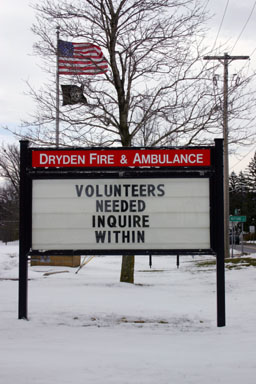
Neptune Hose Company needs volunteers
The audits, except for Etna's, are underway, and copies of the final audits for Neptune, W.B Strong, and Varna (2.6MB PDF) were distributed among the board. (The Dryden Courier has reported on some of the audit findings.)
The Town Board's April 8th meeting will be held at Dryden Fire Hall (map), and will be discussing an incentive retirement plan for firefighters as a recruitment and retention tool.
Six Mile Creek monitoring to begin
The Ithaca Journal reports that the volunteer program monitoring the water quality of Six Mile Creek is set to start in April. If you're interested in volunteering, "contact the Tompkins County Soil and Water District at 257-2340."
Dryden approved participation at the March 18 Town Board meeting.
March 22, 2004
Assemblywoman Lifton in Dryden Thursday
Assemblywoman Barbara Lifton will be holding a public meeting on March 25th at the Dryden Town Hall (map) at 7pm.
Lifton represents all of Tompkins County and the towns of Virgil and Cortlandville as well as the city of Cortland in Cortland County. She is a member of Assembly committees on agriculture, economic development and job creation, environmental conservation, higher education, and mental health.
Comprehensive County Plan at Varna Wednesday
The Tompkins County Planning Department will be presenting the Tompkins County Comprehensive Plan on Wednesday, March 24th, at 7:30pm at the Varna Community Center (map).
The plan hasn't yet been released to the public, and this meeting (along with others in the county) "is designed to give Varna residents an opportunity to view key maps and information, and contribute ideas for the draft plan before it is released to the general public."
March 23, 2004
Marriage, jails, economy
Today's Ithaca Journal, like yesterday's, is very quiet on Dryden, though it covers some county and state issues that have an effect. Today's paper includes:
- a letter from Pat Ober of Dryden opposing gay marriage,
- discussion of the county jail situation,
- Senator Schumer on Tompkins County's prospects and the possibility of the federal government limiting the local share of Medicaid,
- an article noting that Sustainable Tompkins will be hosting 6-week "salons" designed "to share ideas on ways to move toward a more sustainable future", though the nearest ones are in Lansing and Ithaca,
- and an editorial on Tompkins County's possible 'importing' of 13.665 acres of Empire Zone from Schuyler County.
Local giving to presidential candidates
Thanks to Fundrace, a site keeping track of election donation records, you can explore political donations by what location they came from. It's a little limited, in that it chops up information by zip codes, and the Town of Dryden contains both 130-- and 148-- zip codes, but you can get a picture by looking at donations by distance from Dryden Town Hall, or donations by distance from my house, which is near the eastern edge of 14850.
For a very different picture, using zip code only sorts the donations by dollar amount rather than locations - the results for 13053 and 14850 are pretty different.
They also have a national map. It's strange to see counties in the southern tier of New York trending Democrat blue, while the Thruway zone trends more Republican red and neutral white.
I haven't given yet, but this year I definitely will.
John C. Lacy
Here's a biography of an early Dryden resident that's quite different from George Goodrich's earlier portrayals of John Southworth or George Robertson. It's also somewhat funny to note that Goodrich earlier cited the Lacy family for its regular fighting at town meetings.
Goodrich makes occasional typos, and I've tried to preserve them, though no doubt I'm adding my own along the way. In this case, he has a date of 1520 that should be 1620.
Chapter L.
John C. Lacy.
The Lacy (or Lacey) family is of ancient English origin, being known as DeLacey when they came with William the Conqueror from Normandy to England. Richard, the grandfather of John C. Lacy, was born in England. Benjamin, his father, was born in Mausfield, Morris county, New Jersey, October 1, 1768, and died in Dryden October 1, 1820. He came to this township, as a pioneer, in the fall of 1801, with his wife, who was a daughter of Captain Cornelius Carhart, of English and German descent, who commanded a company of sixty men in the battle of Monmouth, June 18, 1778. She was a woman of sound mental qualities, as well as of industrious, frugal habits. She survived her husband thirteen years, keeping her family of six children together on their farm in what is now Dryden village, until her decease.
Benjamin was a farmer, a man of sturdy character and one of the most enterprising and public-spirited pioneers of Dryden. He did much for the cause of education, which was then in its infancy in the new community, Daniel Lacy, the son of his brother Richard as we have seen, having been the first school teacher in Dryden in 1804. In 1819 he erected the first clothing works in Dryden, almost on the present site of the Dryden Woolen Mill, and in the next year, which was the last of his life, he and two of his brothers developed the Dryden Mineral Springs, where the Sanitarium is now located. They had discovered the value of these springs while prospecting for salt. If, in their search for salt, they had possessed the modern means for boring deeper, their search would doubtless have been successful, since extensive beds of this mineral are now found in the adjoining towns of Ithaca and Lansing and in other places in the county where great depths have been reached.
John C. Lacy was born on his father's farm in Dryden near the location of the present stone grist mill, October 21, 1808, and was, consequently, only twelve years of age at the time of his father's death. His means of education were very limited and two years later he commenced, with his older brother Garrett as his partner, to carry on the farm and to pay off the incumbrance which existed upon it. Their efforts were successful and enabled them to eventually buy out the interest of the other children. The partnership of the two brothers continued until 1857, when Garrett decided to remove further west, selling out his interest here to the subject of this chapter, who was thus the only representative of the Lacy pioneers of 1801 to remain in Dryden. About that time, or soon after, he married Maria A., daughter of the late Asa M. White, of Candor, N. Y., whose ancestry is also worthy of special notice. She was in the direct line of descent from Peregrine White, who was the first child born in New England of English parentage, being born on board the Mayflower in the harbor of Cape Cod about December 10, 1520.
Mr. Lacy died October 4, 1893, and his wife, July 18, 1895. Their only child, Ada Belle, is the wife of D. F. Van Vleet, of Ithaca, one of the leaders of the Tompkins County bar. Their son, De Forest Lacey Van Vleet, is the only grand-child of Mr. and Mrs. John C. Lacy.
While Mr. Lacy was a man of conservative judgment and thoughtful, prudent disposition, he was always one of the substantial and reliable men in the community in which he resided. The reminiscences which he wrote on his eightieth birthday, from which we quote on page 74 of this volume, illustrate the thoughtfulness of the man, and preserve for our benefit the knowledge of events which would otherwise be lost. His literary taste, for one brought up without educational advantages, was also very commendable, and the writer remembers from his childhood with what skill and enthusiasm Mr. Lacy used to take part in the debates at the old school-house, forty years ago, with J. W. Dwight, T. J. McElheny, Dr. Montgomery, and others. In 1862 he served as president of Dryden village, and was chosen at other times as assessor and as highway commissioner of the town. He belonged to the first temperance organization in Dryden and, in 1861, he joined the First M. E. church of this village, of which he was always, from that time, a stable and constant member, contributing largely of his time and means to its management and support. While others were more headstrong and impetuous in the pursuit of their undertakings, Mr. Lacy was always deliberate and judicious. He was a man who would have commanded success in any sphere of business to which he might have been called, a thorough and persistent reader and thinker, and possessed an accurate estimate of men and things. His natural kindness of heart and his benevolence endeared him to the community in which he lived, and his pure integrity and honesty of purpose in whatever he did has never been questioned.
Mrs. van Vleet has recently given a beautiful tribute to the memory of her father and mother by placing in the tower of the Southworth Library building a clock, which has already been mentioned. The accuracy and precision of Mr. Lacy, in all of his course of life in the past, is well-symbolized by this time-piece, which is so located as to guide and regulate in Dryden village the affairs of men in the future. Mrs. Van Vleet is also devoting some of her thoughts and leisure time to the improvement of the little farm in Dryden village, upon which her father was born ninety years ago, planting it with nut-bearing trees and orchards, and grading and laying out avenues and walks in such a manner as to stimulate and develop the taste for the beautiful, which she is thus disposed to cultivate in connection with the memory of her parents.
Goodrich, George B. The Centennial History of the Town of Dryden, 1797-1897. Dryden: Dryden Herald Steam Printing House, 1898. Reprinted 1993 by the Dryden Historical Society. Pages 218-220.
(The Dryden Historical Society, which sells this book, may be reached at 607-844-9209.)
Republican congressional primary?
The Auburn Citizen reports that Dr. David Walrath may be running against Congressman Sherwood Boehlert again. Walrath, who nearly defeated Boehlert in the 2002 primary, is well to the right of Boehlert.
It looks like there will also be a Democratic primary in this district, between Jeff Miller of New Hartford and Brian Goodell of Lansing.
March 24, 2004
Journal praises Trumbull on fire companies, annexation
Today's Ithaca Journal editorial praises Town Supervisor Steve Trumbull for improving relations with the fire companies and for the recent annexation of land to the Village for a DOT facility.
There certainly does seem to be much less strife with the fire companies, though some of achieving that is reflected in this year's 31.8% tax levy increase and the things it made possible. The amount of rancor has declined, certainly, even as some of the issues that raised controversy, like audits and quarterly payments, remain in place. Departments seem to be making active efforts to coordinate their equipment and practices.
The impact of annexation is pretty foggy, however, except as it concerns the DOT facility being built on that parcel of land. Board members Christofferson and Michaels objected to the nature of such a 'spot' or 'surgical' annexation in the absence of larger planning, and there are still contentious issues around water and sewer that the village and town have to work out for the entire area north of the Village of Dryden. Perhaps this is a first step toward solving those issues, but in many ways it seems like annexation was the only option for getting the DOT on this parcel because those issues remain unresolved.
I think I'd be more comfortable with the Journal's praise on annexation if Trumbull (admittedly sick, but happy to comment on other issues) had said anything at the meeting about why he voted in favor of it after weeks of uncertainty. The March 17th Dryden Courier article, written after the meeting, doesn't include much more insight into the matter, except for citing Village of Dryden Mayor Reba Taylor that "He called everybody. He talked to everybody. He did his homework."
The Journal didn't find these controversies nearly as unsettling before the election, when it endorsed Varvayanis despite the discontent in the fire companies. Perhaps Dryden's incumbent supervisors are all good?
Oh well. At least they haven't haven't written on the greatness of the county executive idea in a while.
Choose your type size
I've had a few complaints that the type on this site is too small, and my 33-year-old eyes have trouble reading it on one of my smaller monitors. Fortunately, at least for users with newer browsers, there's an easy answer: a stylesheet switcher. (It works in Mozilla, Safari, and recent versions of Internet Explorer and Netscape browsers. It does not work in Netscape 4.x or earlier browsers.)
All of the pages on this site now reference three different stylesheets. The default stylesheet is still the same, but you can choose from small type, Medium Type, or Large Type at the bottom of the left-hand menu. (Clicking on them in this story works too - give it a try.)
When you choose one of these, the browser will save your choice to a cookie named "style". This cookie, accessible only to this web site and containing only the style information, will be read when you visit pages on this site, and used to set the size of the text to your preferred size.
(This site also uses cookies if you post a comment and select "Yes" under "Remember personal info?" Cookies are not used to track users in any way, however. And yes, I wrote a book about cookies a few years ago, so I feel confident talking about what they can and cannot do.)
The code for doing this derives from this excellent article with tweaks listed here under "Gecko debugged", if you're curious about how this operates.
It's not a major change, and I'll put a nicer interface on it at some point, but hopefully it will make visiting the site more pleasant.
Dryden schools issues in The Shopper
Today's Shopper includes two pieces from the Dryden Central School District: a new Board Briefs about a meeting with bleak budget news and a repeat of the invitation to run for the school board noted earlier.
Two other items in The Shopper reflect school concerns - there's an ad from the Dryden Faculty Association that's brief enough to cite in full:
A contract settlement for Dryden Teachers has been proposed by a State Appointed Fact Finder. The Faculty Association is willing to accept these recommendations.
The facts speak for themselves. Ask your School Board member to accept the Fact Finders' recommendation NOW! We have asked for less and waited for longer than necessary for a reasonable settlement.
Dryden Teachers... Working 628 Days WITHOUT A CONTRACT.
There's also an ad from Gary Shelhamer, a middle school technology teacher, encouraging residents to call their board members (phone numbers provided) and attend the March 29th meeting of the board to encourage them to keep the technology program.
March 25, 2004
County Comprehensive Plan examined in Varna
Senior Planner Heather Filiberto and Planning Analyst Tom Mank of the Tompkins County Planning Department presented work on the Tompkins County Comprehensive Plan last night at the Varna Community Center.
The scope of the county plan is very different from the Town of Dryden Comprehensive Plan. The county is not specifying details of how to build in the county, as that's the job of local municipal governments, but rather performing tasks like "coordinate existing plans", "foster intergovernmental collaboration", and "address regional issues". The county plan will include some development scenarios, but Filiberto noted that "you will not see a land use map in our plan."
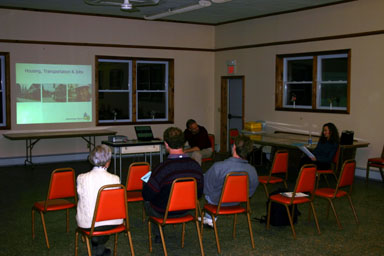
Attendees listen to Heather Filiberto describe the upcoming county plan.
The plan focuses on three clusters of issues: housing, transportation, and jobs; the environment; and neighborhoods and communities. Tompkins County has advantages and difficulties in all three clusters.
Tompkins County has had the benefit of better job growth than either New York State or the United States more generally over the period 1997-2003. While this job growth, derived largely from high tech and light manufacturing, is wonderful to have, it has created a new set of pressures.
Housing costs in Tompkins County are high and rising quickly, as the median cost of a home in Tompkins County has climbed from $100,000 to $134,000 in the last three years. The lower cost of housing in the rural areas of the county, as well as in surrounding counties, has encouraged more and more people to commute. The number of people paying more than 30% of their income for housing in the county, especially among renters, is high (even if students aren't included).

The high cost of housing in Tompkins County, compared to surrounding counties. (Click the picture for a larger version.)
This commuting then puts extra pressure on roads in the county and the neighborhoods through which they pass, a large issue in Varna particularly. The Ithaca-Tompkins County Transportation Council is working on road planning, including a Route 13 Corridor Access Plan. (Tompkins County Area Development is also doing economic planning.)
The environment is another area needing attention. While Tompkins County has the benefit of some beautiful scenery, attendees of prior meetings have emphasized the need for a clear "scenic resource inventory and preservation plan", that sounds likely to become part of the county plan. Water quality needs to be preserved, and Jim Skaley asked later if septic system issues would be addressed as part of this.
It was hard to avoid contrast between the discussion of "strong neighborhoods" and the actual conditions in Varna, especially as trucks rolled by periodically. The slides presented people walking on sidewalks without cars everywhere, and the emphasis on the pedestrian nature sounded good, but doesn't reflect current reality, as came up in questions. Neither 366 nor Turkey Hill Road is a pleasant place to walk or bicycle. There was some discussion of walkability studies, and some hope of having one done in Varna.
Though there were only five members of the public attending (admittedly better than last week's Town Planning Board meeting with two), there were lots of questions, from septic tanks and water quality to managing car and truck traffic, to hope for the creation of a revolving fund for rehabilitating housing to revive communities and concern that proposals for infill at transportation nodes needs to fit with existing communities and not overwhelm them with sudden changes in density.
They also handed out a set of principles, policies, and action items. While not a plan in itself, it provides a rough guide to the kinds of things the plan is meant to accomplish and how they hope to get there.
On April 29, the Planning Department will be holding an open house from 3pm to 7pm and a public meeting from 7pm to 8pm at Dryden Town Hall (map).
More on school, village budget pain
Once again I'm wishing that the Dryden Courier was available on the Web. This week's issue leads with detailed articles on the impact of budget difficulties on both the Dryden Central School District and the Village of Dryden, in greater depth than the Ithaca Journal provided on either the school or the village.
March 26, 2004
Two Charlie Harts
Today's Ithaca Journal has a letter from Nancy Hart of the Town of Dryden, noting that there are two Charlie Harts in the town. Her husband, the Charlie Hart on Lee Road, is not the same person as the Charlie Hart who's been writing letters (for instance, this and this) to the Journal:
While my husband has very high standards and values and follows his conscience when it is time to make political decisions, it is highly unlikely that he would be inclined to share political opinions in any public forum. His name and our full Lee Road address is in the phone book and therefore has been assumed to be the "letter writing Charlie Hart."
We would like that there be no mistaken identity in this matter.
There's also an article on Lansing resident Brian Goodell, who's running for the Democratic nomination for Congress in the 24th District, which includes Dryden.
Water and sewer issues between town and village
The town has posted minutes for the joint meeting of the Dryden Town Board and the Village of Dryden Board of Trustees. Most of the minutes focus on the remarkable complexities of the Cortland Road Sewer District, north of the Village, and water service in the area, though later parts of the meeting reflect a separate Town Board meeting that discussed annexation and fire contracts.
Some of the difficulties in the sewer and water situation include:
- A contract for the Cortland Road Sewer District with a duration of no less than 20 and no more than 40 years, which appears to have expired in 2002, as the town didn't do any bonding for the work
- A main line in that district which is too small - it was built before TC3 appeared - and which runs directly under Route 13, making it difficult to replace
- Infiltration problems in both the town and village portions of the sewage system, letting rainwater get into the lines and overloading the system
- Concrete tanks at the village wastewater plant which are nearing the end of their lifespan
- Questions about who owns the pipes from the high school and TC3 to the village
- "a pipe of clear water coming into the Village system from TC3, and it is obviously not waste, but groundwater," adding to the load on the sewer system
- Billing questions about basing sewer charges on water usage and differences in billing between the village and the town
- Town usage of the sewer system that is somewhere between 30% and 44% of the total
Proposed solutions aren't cheap - "the sanitary sewer improvements that are needed to handle the anticipated flows from the Cortland Road Sewer District total just over one million dollars," just for the costs in the village. The village plans to upgrade its plant to use " a process called sequencing batch reactors and the advantage of that type of treatment system is that it is controlled by electronics that allow the system to know how much flow it is seeing, how fast it is coming in, and it will actually change its own process to accommodate flows during the peak," which comes with a three million dollar price tag "for renovating and rebuilding the plant", though they hope to deal with some of that in grants.
The village is also not excited about extending water service to areas which remain in the town - "Mayor Taylor said that the Village had always been interested in doing water based on annexation."
The two boards parted agreeing to meet together to figure out ways to handle these issues.
The Town Board meeting that followed largely discussed the findings of fact for the annexation, and reflects opinions that stayed constant through the final vote.
There were two questions about the fire department contracts, one about what would happen to town money if a company disbanded or stopped replying to calls in the town, and one about whether annual audits (and the budget to pay for them) was necessary. The first question was put off until next year's contracts, while the audits seem to have remained in place, as Councilman Michaels said that he "believes yearly audits need to be done until we have a few years where there are no major issues in the management letter".
Jobs and lifestyles big issues at Lifton forum
New York State Assemblywoman Barbara Lifton held a public forum last night at Dryden Town Hall, and the audience brought issues very different from the ones I've seen at the Town Board and Planning Board meetings in that same room. The audience was focused on jobs, pay, and making sure that people could enjoy their lives, whatever income they might have.
Lifton began with a presentation on "another critical year in Albany," noting in particular the impact of the Campaign for Fiscal Equity's lawsuit against the state over school funding. There are still lots of challenges to be faced, and the courts may end up appointing a special master to tell the state how to fix its inequities if the legislature and governor can't come up with a plan that meets their expectations. Lifton hopes to have it solved through legislation, as the initial case was only about New York City schools, while inequities in funding are all over the state.
On the budget more generally, she noted that while there is some agreement, it seems "less and less likely that we'll have a budget next week on time." Lifton noted some improvements in the process, like public conference committees, and a proposal to shift the state's financial year by a month from April 1 to May 1. (New York lawmakers only have six weeks for the entire budget process if they hope to be on time.) School funding could be agreed - at least in principle - a year ahead, making it easier for schools to plan.
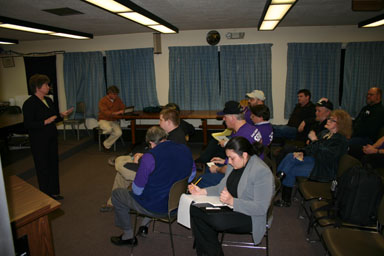
Assemblywoman Barbara Lifton talks about the state budget
Lifton said that while SUNY funding had stayed flat this year, the overall effect of that has been a cut in the long term. She said that while the state once underwrote 75% of SUNY expenses, that fell ten or fifteen years ago to 50%, and it's now 26 or 27%. The SUNY system is going, according to a joke she told, "from being state-supported to state-assisted, and now it's state located."
She also suggested that people who think government just needs to trim the fat should take a look at what the impact of years of cutting has already done, pointing out that state income and corporate taxes have fallen 50% in the last ten years.
The first question from the audience was about lottery money and whether it goes to education. While Lifton said that lottery revenues represent about 10% of education spending, they aren't a dedicated fund that goes only to education. They flow into the general fund, and the state spends some of the money in that fund on education. There was a long discussion about accountability, auditing, and where the money goes, from which my conclusion was that you shouldn't buy lottery tickets to increase state spending on education.
County Legislator Mike Lane asked Lifton whether there was any chance of the state putting a consitutional convention on the ballot again in the hopes of resolving Albany's three-way division of power. Lifton made it clear that there wasn't interest in Albany for that kind of change.
Tony Hall, reporter for the Dryden Courier, asked about the prospects for same-sex marriage. While Lifton emphasized the importance of "equal protection for all New Yorkers" and felt that "government ought to get out of the wedding business", she didn't think there was much hope for the civil unions bill currently being worked on, though she plans to co-sponsor it.
I asked how mental health spending looked this year, given past years' battles over things like keeping the Elmira Psychiatric Center open. Lifton said that while it wasn't getting slashed, it wasn't getting the kind of investment it needs either. Planning ahead seems to be a consistent problem, with sudden changes in budget seasons.
A wide variety of questions about increased fees, from handguns to vehicle registrations to proposed tolls on interstate highways (that one is now off the table) came up, as did the issue of regressive taxation. Near the end of the session Lifton noted that the top 20% in income of New Yorkers pay an average of 9% of their income in state and local taxes, while the bottom 20% pay an average of 16% of their income in those same taxes. The rich are paying more in absolute dollars, but they're not paying nearly as much relative to their ability to pay. Medicare has been pushed down from the state to the counties, putting more burden on their property taxes, and Lifton found Governor Pataki's ten-year play for putting the county share of Medicaid back on the state's rolls inadequate, especially in this first year's tiny changes.
The prospect of an Empire Zone came up, though Lifton suggested it was unlikely that Tompkins County, which has the lowest unemployment rate in the state, especially when the program generally is plagued with questions of mismanagement. Lifton does support current efforts for Tompkins to lease some Empire Zone acreage from Schuyler County, however.
One large issue, made clear by the number of people wearing SEIU Local 200 hats and T-shirts, was the current state of labor negotiations at George Junior Republic. Bob Tompkins described the school, which employs 400 people, 200 of them union, and has $10-11 million in revenue on the agency side, as being "in the midst of potential disaster."
Some of the issues, Tompkins said, were strictly between the union and their employer, but others were caused at least in part by the state. Pricing issues, like the situation where the agency can charge more per day but faces a cap on the overall charge, has limited revenue. The state denied a cost of living adjustment pay increase for employees. The turnover rate for employees there has improved from eight months six to eight years ago to two to three years today, but that's likely to fall again given issues in current bargaining, notably management's wanting to halt payment of family health insurance. As one employee said, "this place has been paying people poverty level and then wondering why turnover is so high."
Other George Junior Republic members noted that $8.88 an hour, with minimal raises, just isn't enough for the work. State employees who do similar work get paid better, as do employees at newer agencies, like KidsPeace in Seneca County.
Lifton agreed that George Junior Republic is crucial, reaching kids to keep them out of expensive prisons and treatment later, and promised to look into what was happening. She noted that "we say we value work, but we don't want to pay for it, and we say we value children, but we don't pay people who work with children very well."
There were also concerns about cuts to vocational education. Lifton agreed that the governor "has a thing about BOCES", but said that this is something that needs to go forward, and noted that BOCES does a variety of different projects that districts can't do on their own. She said both she and the Assembly were opposed to the governor's proposed cuts: "He calls it flex-aid, we call it flex-cuts."
Lifestyle issues brought up near the end of the presentation had the audience buzzing: the smoking prohibition in bars and restaurants and possible repeal of the motorcycle helmet law.
Dirk Galbraith, one of the owners of the Moonshadow Tavern on the Ithaca Commons, noted that his business had shrunk from 11 employees to 8, and expected to pay less in sales tax in the future. He described it as "a draconian solution to the perceived problem" and noted that some bar owners had pretty much given up, concluding that they had to break the law to stay in business, and would likely be heading out of business soon. He noted a possible reprieve in a law being considered for proposal in the legislature which would permit smoking in places using new kinds of ventilators, suggested that restaurants and taverns should be looked at different, and encouraged Lifton to keep an open mind. Lifton, though defending her vote on the smoking ban on grounds of employee health, said it had been a difficult decision and agreed to look at the issue again. As he left, Galbraith gave Lifton a small stack of free drink tokens, and Lifton checked to make sure they were worth less than the $75 limit for gifts to legislators.
(Questions about the drinking age also came up during this discussion, with an audience member questioning our denying people old enough to serve in the military the right to have an alcoholic drink. Lifton agreed that our laws on the matter are hypocritical. It doesn't seem likely that the drinking age will come down any time soon, however.)
John Steele of Tompkins County ABATE, American Bikers Aimed Toward Education, brought up both a right of way bill that Lifton said sounded good and the prospect of repealing the law requiring motorcycle helmets. He (and others) said they do wear helmets, even in states where they aren't required, but would prefer to have a choice. Steele noted that many New York motorcyclists are now attending events in Pennsylvania, where the law has been repealed. Lifton agreed to look into it and get back to him.
The evening at Town Hall ended on a strange note, with a State Policeman escorting a man through people leaving the meeting for arraignment in Town Court.
March 27, 2004
Dryden laurels
It's been a very quiet week for Dryden news in the Ithaca Journal, and today continues that trend. In Darts & Laurels, there are three laurels to or from Dryden residents and businesses:
- Mary Chapman of Dryden thanks "patient, knowledgeable and selfless volunteer seniors who assist the anxiety prone through the annual maze of tax preparation."
- the Dispositional Alternatives Program of Family & Children's Service thanks a lot of businesses for their participation in a spaghetti dinner fundraiser, including Dryden businesses Autoworks, Dryden Dollar Store, Hydroponic Lettuce Project, Ludgate Farms, and Todi's.
- the Day Care & Child Development Council similarly thanks a lot of businesses, including Eagle Broadcasting and Ludgate Farms.
"Our Towns" coming to the Journal
The print edition (but not the online edition) of today's Ithaca Journal announces that starting Tuesday, the Journal will include a new section called "Our Towns", which covers town news Tuesday through Thursday. Tuesdays will include Ulysses and Enfield, Wednesdays will include Dryden and Groton, and Thursdays will cover Lansing and the Town of Ithaca. (Newfield, Danby, and Caroline coverage is in the works.)
The Journal will also be having a "Coffee with the Journal" session at the Dryden Central School District offices (map) on Monday, March 29th from 3:30 to 4:30pm. They note:
At these coffees, readers often offer suggestions for future coverage, an idea for an improvement, or a beef or a compliment on past coverage.
Freese Road bridge closed Monday to April 15th
I missed a Dryden item in today's Journal, announcing that the the bridge on Freese Road, between Route 366 in Varna and Hanshaw Road, will be closed from March 29th to April 15th. The Tompkins County Highway Department will be repairing the bridge.
(The Town of Dryden is also doing work in the same area, on the Varna side, replacing a sewer pump, which the Town Board approved in February.)
March 28, 2004
Gilesville: tales of a lost hamlet
George Goodrich's Centennial History of the Town of Dryden includes a chapter on "Isaiah Giles and Gilesville". There was no Gilesville on any of the maps I had (including the one in Goodrich's book), so I asked about it last Saturday at the Dryden Historical Society. They pointed me to W. Glen Norris' The Origin of Place Names in Tompkins County, where the sad conclusion is:
the little settlement, which was situated between Etna and Freeville where the main road crosses Fall Creek, disappeared years ago and the name has been forgotten. (23)
Rachel Dickinson, in the Dryden section of The Towns of Tompkins County, described the area as 'Werninckville', presumbably after the furniture store (map) in the area, while discussing the 1996 flooding there.
The actual story is one of Goodrich's better ones, I think. The Giles family seems to have been an impressive group of people, though one regularly tried by difficulty, and which had largely disappeared even by 1897. Goodrich notes that in addition to being a pioneer of the town, Isaiah Giles was a pioneer of the separation of government and religion, despite his strong religious beliefs.
Chapter XXXIV.
Isaiah Giles and Gilesville
Early in the history of the country there came to New England from the mountains of Wales three sturdy brothers with their families, bearing the name of Giles or Gyles. They bore the characteristics that marked the sturdy and and determined followers of Owen Glendower. Courageous, thrifty and resourceful, they regarded nothing better in man than honor and self-reliance. One of these families or their descendants came early into Eastern New York, and it is from this branch that sprang the family that forms the subject of the following sketch. Owing to a serious misfortune that befell the family early in the present century, mention of which will hereafter be made, many records of the history of the family were totally lost, so that much pertaining to such history, prior to that event, has been perpetuated more by tradition than otherwise. But in the preparation of this paper all the care that the time would permit has been taken to reject everything that did not seem well authenticated.
In the summer of 1801 Isaiah Giles came from Orange county to begin a home for himself and family in the town of Dryden upon lands that he had recently purchased on Lot 15. He began his little clearing about, and built his log cabin near, the spring that in later years has been known as the Cheese Factory spring, just northwest of Freeville. After building the cabin he extended his clearing sufficiently to put in a piece of corn the next spring. He then returned east and early the next year, in the month of March, he came back, bringing his wife and children. He did not have time when putting up his house to put on the roof, so that one of the first things to be done, when moving in, was to shovel out the snow, and then cut and put up basswood bark for a roof. Then, with a blanket hung up at the doorway the home and castle of the Giles family was complete, for the time. From that time until the opening of spring, he was engaged in splitting and smoothing up puncheons for a door and flooring, and in building bunks for sleeping. In all the toil and care incident to such a beginning he had an earnest and efficient helper in the person of his good wife, Sarah Lanterman, whom he had married some nine years before. Their family then consisted of seven children, including two pairs of twins. There were subsequently born to them two sons and a daughter. To these children we shall have occasion to refer farther on.
Isaiah Giles and his wife were earnest, thrifty, pushing people, and about them soon began to cluster the evidences of their industry and economy. In the fall of 1802 they harvested their first corn and potatoes. The winter brought many privations and discomforts, but they passed through it without serious sickness or mishap. In the summer of 1803 they harvested their first crop of wheat, and threshed it in the little log barn that they had built the year before. They winnowed away the chaff, and carried the grist to the mill of Elder Daniel White, at Freeville, to be ground, and then had their first wheat bread in the town of Dryden. The clearings and improvements were extended each year by dint of hard labor and good management. But in spite of the energy and thrift of Mr. and Mrs. Giles a great misfortune was in store for them.
About 1806 there came a man by the name of Thompson who laid claim to the land which Isaiah had bought. Investigation showed that Thompson's title was good and that Giles had been defrauded in his purchase. Instances of this kind were not uncommon in the early history of Dryden. But the same spirit that had begun the first home in Dryden was ready to begin again. Gathering together his effects he went down upon Fall Creek at the point afterwards for years known as "Gilesville" and bought another tract of land and began anew. It was here that he, with his sons, built a saw-mill and a carding and fulling mill, and subsequently his sons built an extensive tannery.
Isaiah Giles was a man of considerable prominence in the affairs of the town, at one time serving as magistrate. In this connection a funny circumstance occurred. The writer repeats it as it was told him by Samuel Giles in 1870. Squire Giles, as he was then known, was an ardent Methodist withal, and one dark night a man by the name of Pipher, from the town of Groton, came with his wife to the Giles house and aroused the family, saying that they wanted to be baptised, and that the Lord's business was very urgent. They seemed to have the impression that the civil magistrate was the proper one to administer baptism. Esquire Giles explained the matter to them and directed them to Elder Daniel White, at Freeville, whom they aroused, and who administered the ordinance of baptism and sent them on their way rejoicing.
Although a strong Methodist and feeling the interests of the church of paramount importance, it is said Mr. Giles presented a resolution or notion at town meeting, "that the income from the gospel and school fund should thereafter be used wholly for school purposes." The resolution was carried through his influence, and that of some others.
Mr. Giles died when comparatively a young man, in 1822. His sickness was short and his death unexpected, but he died as he had lived, "diligent in business, fervent in spirit," and a firm believer in the tenets of the church of his choice. His wife survived him forty years, dying in 1862 a woman of great force of character, combined with very good judgment. These qualities were manifested in the manner in which she managed her household after the death of her husband.
Of the ten children of the family six lived to manhood and womanhood. Polly, the oldest of these, married John Van Nortwick, and died in 1823 at the age of twenty-six years. The other surviving daughter married Samuel Mead, and afterwards in 1857 moved to Iowa, where she died at the age of eighty years. It is of the sons that what follows will pertain more particularly.
Samuel and John Giles were twins born in Orange county in 1798. James Giles was born in the same county in 1800. These came with their parents to Dryden in 1802, and may be justly classed among the pioneers of the town. Samuel Giles learned the trade of cabinet making, and John served his time as a tanner and currier with Burnett Cook, late of Ulysses. It was here that he first saw her who was destined in after years to become his wife. She was then but a child in the cradle, and he a lad in his teens. Samuel and John, having finished their apprenticeships, worked as journeymen for some years. James in the meantime had staid at home with his mother and carried on the saw-mill and fulling mill, assisted by an adopted brother, George Van Horn, whose family was in after years well known in the Town of Dryden.
About 1823 Samuel and James went west to seek their fortunes, going as far as Indianapolis, Ind. After prospecting for a time and working at intervals, they concluded that while the soil was wonderfully fertile and the country presented many inducements to young men, the "shakes," as they termed it, more than offset the advantages. So at the beginning of winter they started for Dryden on foot. It was on this journey that their knowledge of mechanics stood them in good stead. They had the opportunity of putting into operation for different parties several carding machines, and when they reached home each had more money than when they started.
It was just after this that Samuel and John decided to build the tannery at Gilesville. This business they carried on with considerable success until 1832, when they built the Tompkins House, a historic hotel in the city of Ithaca. John in the meantime had waited until the child whose cradle he had rocked when an apprentice boy had grown to young womanhood, and in 1828 he was married to her (then Miss Mary A. Cook.) The union was a happy one. Samuel was married in 1832 to Miss Susan Depew.
In 1843, tired of hotel-keeping, they bought the Eddy property on East Hill, at Ithaca, on which they afterward built them a home, which they occupied until their deaths. These twin brothers during all their lives after beginning the tannery business at Gilesville occupied the same house and did business in partnership. John died in Agust, 1862, and Samuel in July, 1871, and his wife in February, 1872. The widow of John is still living at Trumansburg, N. Y.
James Giles was married to Barbara Raymer and shortly after bought one hundred acres of land on Lot 34, of Dryden. By subsequent additions thereto he owned three hundred and twenty acres. He was a man of unusual force of character, and possessed rare mechanical ability. He was a thorough farmer and early turned his attention to dairying, and was among the first in the town to realize what was then known as fancy prices for butter. He early saw that machinery must play a prominent part in farming, and he began fitting his meadows for the mower, and it was upon his farm one of the first, if not the first, mowers was used in town. For many years he was actively engaged in selling mowers and reapers, and in buying and selling butter, of which article he was long known as being a competent judge. In his good wife he found an efficient helpmate and a wise counselor. They were the parents of eight children, one son and seven daughters. In 1867, feeling the weight of years bearing upon them, they arranged to give up the hard work of life, and passed the management of affairs to the son, Capt. J. J. Giles of Freeville. Mrs. Giles died in November, 1887, and Mr. Giles in October, 1890, at the age of 90 years and 28 days. He had lived as long if not longer in the town of Dryden than any other person. Of the family of James Giles there are still living one son and four daughters.
Sarah Lanterman Giles, the wife of Isaiah Giles died in 1862 at the age of 91 years and 13 days.
In speaking of the misfortunes that befell the family of Isaiah Giles it may be mentioned that soon after moving to Fall Creek an event occurred that ever afterward cast a shadow over the life of James. It occurred during the time in the year when the latter was engaged in running the saw-mill. The little brother, Weyburn, some four or five years old, had been down to the mill, and, as his brother supposed, had gone to the house, as he saw him go down the path and across the foot bridge spanning the race leading from the mill. But it seems that something in the race had attracted the child and he had either climbed down or fallen into the race, just as James hoisted the gate. The rush of the waters and the noise of the mill drowned his cries, but the brother caught a glimpse of his clothing as he was struggling in the water. To shut the gate was but the work of a moment and he rushed to his rescue, but it was too late; as he carried the dripping form to the house he found that life was extinct.
It was when the creek farm was nearly paid for, and at a time when Isaiah Giles had gone to Dryden to make the last payment, the family home was burned. Little or nothing was saved from the house. Then it was that the family records afore-mentioned were lost.
Ai W. Giles, born in 1810, was the youngest child. When he came to man's estate he worked for and with Samuel Giles until they left the Tompkins House. He then took charge of it and for some time conducted the business alone. He at one time had charge of the tannery at Gilesville for a short period. He was engaged in the shoe business for a short time at Ithaca, and occupied the property known as the Half Way House, on the Bridle Road. He was afterward connected with the milling business at Free Hollow, as it was then known, and kept a flour and feed store in Ithaca. He was married in 1846 to Miss Nancy Leach, of Chenango county, N. Y. He died childless in Ithaca in November, 1889. His wife survived him some three or four years.
In matters of politics the Giles brothers were Democrats until 1856, when they became Republicans and remained such until the end. They never took any active part in political matters and none of them ever held any public office save Samuel, who in 1835 was trustee of the village of Ithaca, and in 1845 was supervisor of the town of Ithaca. In 1854, Samuel Giles was named by the Legislature, with Stephen B. Cushing and Horace Mack, as a building committee in the act authorizing the building of the Court House at Ithaca. S. & J. Giles was a firm name known and honored among business men of Central New York. Unlike in temperament, yet they lived and worked together without friction. John died childless and Samuel lived to bury his last child, Miss Sarah Giles, in 1866.
The records of Tompkins county show that the first will proven in the county, September 6, 1817, was witnessed by Isaiah and Sarah Giles, being the will of John Morris, of Lansing, and presumably drawn by Isaiah Giles. The family name has now but one representative, and when Capt. J. J. Giles shall have been gathered to his fathers, a name for nearly one hundred years so well and favorably known in the town will be known only as a matter of history.
Goodrich, George B. The Centennial History of the Town of Dryden, 1797-1897. Dryden: Dryden Herald Steam Printing House, 1898. Reprinted 1993 by the Dryden Historical Society. Pages 144-9.
(The Dryden Historical Society, which sells this book, may be reached at 607-844-9209.)
March 29, 2004
More on Sustainable Tompkins
Today's Ithaca Journal includes a guest column on the Sustainable Tompkins initiative:
Its aim is to consider what this region would be like if it were better designed to assure economic stability, social well being and the continued integrity of our ecosystems.
As noted last week, they're holding "Sustainability Salons" for the next six weeks. None of those are in Dryden, though there's one in Lansing tonight at Rogue's Harbor (map) from 5:30pm to 7pm, continuing Mondays through May 3.
Public hearings at April 8th Town Board meeting
Today's Ithaca Journal contains lots of notices for public hearings to be held at the Town Board's April 8 meeting. The full text of the notices follows, but a quick description of the hearings is:
- There are two hearings on property tax exemptions, one for people with disabilities that affect their incomes, and one for senior citizens. The Ithaca Journal had an article on these exemptions March 5th.
- There are two hearings on sewer system issues. One regards the Cortland Road Sewer District that has been the source of complex issues between the Town and Village of Dryden, while the other affects Dryden residents in the sewage districts around Varna and Route 13, and is related to phosphorous removal at the City of Ithaca Sewage Treatment Plant.
NOTICE OF PUBLIC HEARING ON PROPOSED TOWN OF DRYDEN LOCAL LAW
PLEASE TAKE NOTICE that the Town Board of the Town of Dryden will hold a public hearing on a proposed local law which will provide for an increase in the partial exemption for real property owned by persons with disabilities whose incomes are limited by reasons of such disability. Copies of the proposed local law are available at the Town clerk's Office. The proposed local law will increase the amount of the exemption to the maximum amount permitted by Real Property Tax Law Section 459-C.
The public hearing on the proposed local law will be held at 7:30 p.m. prevailing time, at the Dryden Fire Hall, Neptune Drive, Dryden, New York, on April 8, 2004 at which time interested parties will be heard.
March 29, 2004
By Order of the Town Board of the Town of Dryden.
By Bambi L. Hollenbeck Town Clerk
NOTICE OF PUBLIC HEARING ON PROPOSED TOWN OF DRYDEN RESOLUTION
PLEASE TAKE NOTICE that the Town Board of the Town of Dryden will hold a public hearing on a proposed resolution pursuant to Real Property Tax Law Section 467 which will provide for senior citizens or aged exemptions based on income eligibility levels.
Copies of the resolution are available at the Town Clerk's Office. The proposed resolution will be held at 7:15 p.m. prevailing time at the Dryden Fire Hall, Neptune Drive, Dryden, New York, on April 8, 2004, at which time interested parties will be heard.
March 29, 2004.
By Order of the Town Board of the Town of Dryden
By Bambi L. Hollenbeck
Town Clerk
NOTICE OF PUBLIC HEARING ON PROPOSED TOWN OF DRYDEN LOCAL LAW
PLEASE TAKE NOTICE that the Town Board of the Town of Dryden will hold a public hearing at the Dryden Fire Hall, Neptune Drive, Dryden, New York, on April 8, 2004, 7:00 o'clock p.m. prevailing time, to hear all interested persons for or against a proposed Local Law entitled "A Local Law repealing Local Law No. 4 of the year 1983 and re-establishing the Cortland Road Sewer District Sewer Rent Law." The proposed local law would provide the basis of the charge of sewer rents, establish payment dates, penalties for late payment and a method for enforcement and collection of sewer rents, establish a formula for the calculation of sewer rents including minimums thereof and provide for the use of the revenues from sewer rents. This local law also repeals Local Law No. 4 of the 1983 and will apply to the Cortland Road Sewer District and to any future sewer districts which utilize the wastewater treatment services of the Village of Dryden wastewater facility. The complete text of the proposed Local Las is available from the Town Clerk.
March 29, 2004
By Order of the Town Board of the Town of Dryden
By Bambi L. Hollenbeck
Town Clerk
TOWN OF DRYDEN NOTICE OF PUBLIC HEARING
PLEASE TAKE NOTICE that the Town Board of the Town of Dryden adopted an order on March 11, 2004 calling a public hearing on a plan, report and map prepared in connection with a proposed phosphorous removal project for the sewage treatment plant in the City of Ithaca serving the Town of Dryden. The public hearing will be held at the Dryden Fire Hall, Neptune Drive, Dryden New York at 7:45 P.M. prevailing time on April 8, 2004. The order calling the public hearing as follows:
ORDER CALLING PUBLIC HEARING
IN THE MATTER OF THE PROPOSED PHOSPHOROUS REMOVAL PROJECT FOR THE SEWAGE TREATMENT PLANT IN THE CITY OF ITHACA SERVING THE TOWN OF DRYDEN TO BE KNOWN AS THE JOINT SEWAGE TREATMENT PLANT PHOSPHOROUS REMOVAL IMPROVEMENTS PROJECT PURSUANT TO TOWN LAW SECTION 202-b
WHEREAS, a plan, report and map have been duly prepared in such manner and in such detail as heretofore has been determined by the Town Board of the Town of Dryden, Tompkins County New York, relating to the construction, pursuant to Town Law Section 202-b of sewer system improvements to be known and identified as the Joint Sewage Treatment Plant Phosphorus Improvement Project, and hereinafter also referred to as "improvement,' to provide such sewer improvement to the present sewer treatment plant in the City of Ithaca managed jointly with the Towns of Ithaca and Dryden and providing sewage treatment services for the Town sewer districts served by such sewage treatment plant, such sewer system improvement to be constructed and owned by the Town of Ithaca, Town of Dryden, and the City of Ithaca, and
WHEREAS, said plan, report and map have been prepared by Stearns and Wheler, Professional Engineers, duly licensed by the State of New York and have been filed in the office of the Town Clerk where they are available for public inspection, and
WHEREAS, the area of said Town determined to be benefited by said Joint Sewage Treatment Plant Phosphorous Removal Improvement Project consists of the entire area of said Town sewer districts served by the sewage treatment plant in the City of Ithaca, and
WHEREAS, the proposed Joint Sewage Treatment Plant Phosphorous Removal Improvement Project consists of the sewer improvements set forth below, as more particularly shown and described in said map, plan and report presently on file in the Office of the Town Clerk:
Construction and installation of a teritary high rate settling process and associated reinforced concrete structure on piles at the end of the current process stream, adjacent to the final effluent channel at the jointly operated sewage treatment plant located at 525 Third Street, Ithaca, New York, together with associated controls, piping, and other structures, and
WHEREAS, a public hearing on said plan, report and map was held by the Town Board of the Town of Dryden on July 9, 2003 at which hearing all interested persons in the subject were heard on the questions of providing of said Joint Sewage Treatment Phosphorous Removal Improvement Project, and the question of executing any related agreement, and
WHEREAS, following said public hearing the Town Board of the Town of Dryden adopted a Public Interest Order on July 9, 2003, approving the improvement with a maximum proposed amount to be expended of $4,115,000 of which the Town of Dryden's share was not to exceed $81,477.00, and
WHEREAS, following the construction bid opening for the improvement, the lowest responsible bids exceed the project budget resulting in a revised total project cost, and
WHEREAS, the Town Board of the Town of Dryden adopted an order on September 11, 2003, calling a further public hearing upon said plan, report and map including a revised estimate of cost and the question of providing of said Joint Sewage Treatment Plant Phosphorous Removal Improvement Project, and the question of executing any related agreement, and to hear all persons interested in the subject thereof, all in accordance with the provisions of Town Law Section 202-b and applicable provisions of the General Municipal Law and Local Finance Law, and
WHEREAS, the Town Board of Town of Dryden held a public hearing on October 1, 2003 to further consider the aforesaid plan, report and map, and the question of providing said joint improvement project and the question and the question of executing the related agreement, and
WHEREAS, following said public hearing the Town Board of the Town of Dryden adopted a Public Interest Order on October 1, 2003 which approved the joint improvement with a maximum proposed amount to be expanded of $4,448,500.00 of which the Town of Dryden's share is not to exceed $88,070.41, and approved a plan for payment of the Town of Dryden's share, and
WHEREAS, due to delays in receiving a satisfactory commitment from New York State for its anticipated funding share, the time in which the bidders on the project could be held to their bids expired and such bidders will no longer honor the amounts of their previous bids, and
WHEREAS, newly revised estimated of the total project cost result in a higher estimated maximum amount proposed to be expended, and
WHEREAS, it is now necessary to consider approving a revised maximum amount to be expended by the Town of Dryden for the aforesaid improvements, and
WHEREAS, the revised maximum proposed to be expended for the aforesaid improvement is now $4,975,000.00 of which the Town of Dryden's share is not to exceed $98,505.00, and the proposed method of payment of the Town's share consists of payment of said Town's share out of the surplus funds and current revenues in the Town of Dryden Sewer Districts, and
WHEREAS, the implementation of this project will be through a joint agreement with the City of Ithaca and the Town of Ithaca.
NOW, THEREFORE, IT IS HEREBY ORDERED, by the Town Board of the Town of Dryden, Tompkins County, New York, as follows:
Section 1. A public hearing will be held at the Dryden Fire Hall, Neptune Drive, Dryden, in said Town, on the 8th day of April, 2004 at 7:45 o'clock P.M., to consider the aforesaid plan, report and map and the questions of the providing of said Joint Sewage Treatment Phosphorous Removal Improvement project, and to hear all persons interested in the subject thereof, all in accordance with the provisions of Town Law Section 202-b and applicable provisions of the General Municipal Law and Local Finance Law.
Section 2. The Town Clerk is hereby authorized and directed to cause a copy of this order to be published once in the official newspaper of the Municipality, and also to post a copy thereof on the Town signboard maintained by the Clerk, not less than ten nor more than twenty days before the day designated for the hearing as aforesaid.
Section 3. This order shall take effect immediately.
The question of the adoption of the foregoing order was upon motion of Councilperson Stelick, seconded by Supervisor Trumbull, duly put to a vote on a roll call, which resulted as follows:
Supervisor Trumbull Voting Yes
Councilperson Michael Voting Yes
Councilperson Stelick Voting Yes
Councilperson Christofferson Voting Yes
Councilperson Hattery Voting Yes
The order was thereupon declared duly adopted.
March 29, 2004
BY ORDER OF THE TOWN BOARD
Bambi L. Hollenbeck, Town Clerk
Ithaca Journal meeting
I went to the Ithaca Journal's "Coffee with the Journal" session today, and came away pretty impressed. I'm not always thrilled with either the Journal's reporting or their editorial at times, and mentioned it, but the people there - Managing Editor Bruce Estes, Metro Editor John Carberry, and Opinion Page Editor Joseph Schwartz - had lots of good ideas and interest in doing more and better in the future, especially as they launch the "Our Towns" section.
The opportunity for "Our Towns" seemed to come from some reorganization in the shape of the paper, especially around the classifieds, and the Journal sounds ready to take advantage of that opportunity. Every Wednesday there will be a section focused on Dryden and Groton, and it sounds like they'll be using the space in part for articles on news stories with the kind of analysis that's hard to do when covering a meeting for the next day's paper. Other parts will be dedicated to profiles of people, businesses, and events in the community. Breaking news will still appear in the regular local section.
I did pester them about their earlier obsession with the County Executive proposal and had some questions about the fairly chaotic way the fire company issues were handled, not to mention their fluctuating editorials on that subject, and they had reasonable and polite responses.
Apart from Journal staff, only three people attended - myself, Dryden Central School Board President Rachel Dickinson, and Dryden Superintendent Patricia Archambault. Having it during working hours makes it hard to get people out, but I'm glad they had it in any event.
I also liked this tree behind the Dryden Central School District office building:
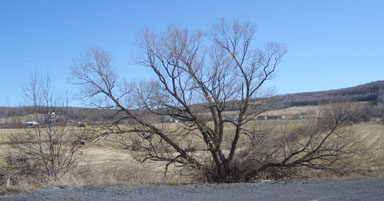
A complicated tree behind the Dryden Central School District office
March 30, 2004
300 attend Dryden School Board meeting
Difficult issues seem to bring people to meetings, and the Dryden school budget has certainly been difficult. This morning's Ithaca Journal looks at last night's meeting, the attendees seeking mostly to save programs, and the options facing the board.
The Journal notes that the first speaker was one of the few to support budget cuts, and that most comments were in support of saving programs, even if it did mean greater expense. A contingency budget with a 5.41% tax levy increase, which would "cut the entire athletics program in addition to other staffing cuts", is a possibility if voters reject the budget. Board members support proposals ranging from a 12.5% increase to an 18.44% increase. Even that 18.44% increase involves cutting three staff positions funded by a one-year grant.
It doesn't sound like the district will be getting all that much help from the state, either, if the Zarb Commission report's recommendations for increasing education spending comes to pass, as it offers a smaller amount of money than many proposals (though more than is in the current budget) and sends over three-quarters of it downstate. The Campaign for Fiscal Equity, which began the lawsuit leading to this year's emphasis on education funding, has a fairly tepid response to the Zarb report, and will be issuing its own report in a few days. The New York Times (registration required) has several stories on the report (1 2 3 4).
Sustainable Tompkins salon meets
Thirteen people, including four Dryden residents, met last night at Rogues Harbor in Lansing as part of the Sustainable Tompkins project. This was the first meeting of the "salon", which will gather every Monday there through May 3. (There are salons every night of the week, but this is the one that seemed closest to Dryden.)
The meeting, which ran according to Conversation Cafe process, talked about a wide range of things connected to sustainability and making a smaller impact on the earth. Some attendees talked about national politics (like energy policy), others about state politics (like taxes being pushed on to the counties), others about local politics (like the complexities of the Town of Dryden Draft Comprehensive Plan), and others about the many things people can do without having to deal with the political process explicitly. Making sustainable choices affordable was a key concern throughout.
One attendee noted that he'd been worried that it "would be a group of yuppie tree-huggers" and was happy that didn't turn out to be the case. There were no instant answers, but it was a good gathering of people looking for better ways to do things.
The salons are open to the public, and there's no requirement of prior attendance to go, so you can show up any time in the next five weeks at one of these meetings if you'd like to see what's going on.
Tompkins County industrial development and wages
Dryden County Legislator Mike Lane is quoted a lot in an Ithaca Journal story about the Tompkins County Industrial Development Agency and C&D Assembly in Groton, in his role as chair of the IDA's Board of Directors.
The questions are fairly complicated, but center on what's an appropriate use of taxpayer money, expressed through tax abatements. C&D seems to be doing well and growing, but the jobs they're creating start out at $6.42, well below the $8.68 most recently calculated as a 'living wage' for Tompkins County. Lane notes:
"It is an industrial facility providing jobs in a rural area. We would like to help them in their expansion. But we are concerned about the pay and benefits. If a business isn't approaching livable wage characteristics, we have to ask ourselves, 'Should we be subsidizing jobs at taxpayer expense?'... We are a conservative IDA.... We try to be careful with the abatements we give. They need to be effective for the local economy. They aren't some kind of gift. We expect some kind of return."
The company describes the lower-wage jobs as a way "to screen people," though they also note that employees they've trained have gone elsewhere to work because of a lack of opportunities in the company, something they hope to help with this expansion. The number of employees at the company has doubled in the last year, and the article concludes on a hopeful note that things can be worked out. The abatements received a preliminary approval, and the final vote is Friday.
Update: The tax breaks were approved.
Turkey Hill and Monkey Run
Moving toward Varna from the last set of buildings, 1101 Dryden Road is the last house in the 1100 block, though it looks like it's on Turkey Hill Road. 2 Monkey Run Road, though it isn't precisely on 366, looks as if it is. (Its driveway seems to be on Forest Lane, complicating things further.)
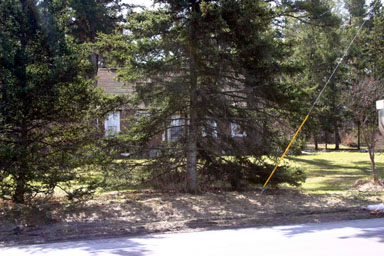
1101 Dryden Road (map)
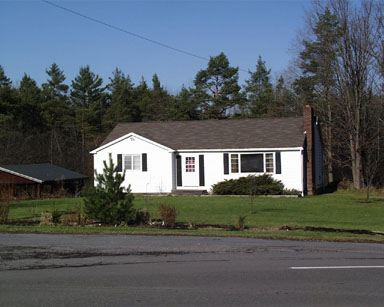
2 Monkey Run Road (map)
March 31, 2004
Premiere of Our Towns: Dryden and Groton
The Ithaca Journal's first installment of the "Our Towns" page on Dryden and Groton arrived today, on page 3B. Most of the section is available on the Journal's site.
The lead article is Dryden surveys golf course purchase (which I'll discuss in a separate entry). In features that will be regulars on the page, there are a Dryden Town Talk column called Exchange gives English teacher a new perspective (in which English means 'from England'), Briefly in Dryden, Ask Your Public Official, in which Dryden Environmental Planner Debbie Gross talks about issues facing the town, and a Family Fun section.
The print edition includes some additional statistics on educational attainment in Groton and Dryden, as well as a community calendar.
Examining the golf course purchase
Today's golf course article does what I'd hoped the Journal would do in the Our Towns section - take a deeper look at an issue that's been building for some time. The article captures some of the division on the Town Board over the issue, and talks with the architectural firm the board hired to examine its prospects as a course. It also, I'm afraid, gives town board member Steve Stelick a chance to make it sound like the purchase won't cost town taxpayers anything:
According to Stelick, funds for the purchase would be taken from the town's reserves.
"We wouldn't finance it and we wouldn't raise taxes for it."
That statement seems squarely focused on the short-term impact, as the reserves represent taxes already paid in, held as a buffer against the prospect of raising taxes later. It looks like I need to do some research on the level of the reserves held by the Town of Dryden over the past few years to see how much of a potential impact this would be. A $350,000 golf course might not seem like much compared to millions held in reserve, but when you compare it to this year's tax levy for the entire town of $846,000, it becomes a much bigger number.
At the same time, I'm very happy to see the town taking an active interest in buying and hopefully preserving green space in the town. It could potentially set a precedent that opens new possibilities for the future. The recreation possibilities are definitely also worth considering. This might be a case where the Town can take direct action to improve the lives of its citizens.
EPA speaker on Smart Growth
EPA Senior Policy Analyst Lynn Richards will be speaking at 7:30pm tonight at the Ramada Inn (map) on "Smart Growth: More Choices, Better Places". I'm especially interested in this, as Richards has written recently on Alternatives to Subsidizing Edge Development: Strategies for Preserving Rural Landscapes, and will hopefully talk about some issues relevant to situations like Dryden's current planning process.
(And yes, I'm working on creating a calendar for this site so I do less springing of events at the last minute like this.)
Dryden Courier on schools, Lifton, more
This week's Dryden Courier includes detailed coverage of Monday night's Dryden School Board meeting, the forum Barbara Lifton had last week, Sertoma honors for Teresa Carnrike and Bill Deming, and Jaqueline Mathews, the teacher from England who has exchanged positions for a few weeks with Dryden teacher Cheryl Van Riper.
